#so yeah I’ll mainly post them in a sibling context
Explore tagged Tumblr posts
Note
You should like totally draw legend because I totally did not just request you to do it..... 🥺
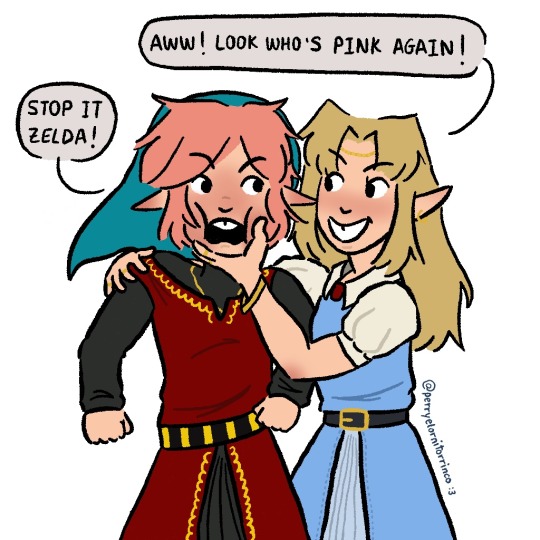
What about Legend and Fable?! :·3
My brain is totally rotted with these two. I LOVE THEM SO MUCH, THE ENERGY THEY GIVE- RAAAAHHHH! (This is my moment to spread Legend and Fable are twins propaganda muhehehehehe >:·3)
Wait I think this is the first time I post something with Fable, she’s the best, she’s just Legend with long blond hair, I love her smsmsm
Thank you anon for this ask, my brainrot is even stronger now >:D, hope you like the doodle!!!!!!💖💖💖
#linkeduniverse#linked universe#lu fanart#my art#lu legend#linked universe legend#lu fable#alttp zelda#as long as they’re not siblings the ship’s okay for me tho#I won’t say no to Legend content#but I just like them SO MUCH as twins#(and I cannot live without ravioli I'm sorry)#so yeah I’ll mainly post them in a sibling context#and ofc Legend's the youngest#and Fable loves to make sure everyone knows she's the big sister by 3 minutes >:·3#I love drawing these two so much 😭😭💖💖#also Zelda's casual dress is peak in Zelda dresses omg#RAAAAAAHHHHH I LOVE BLUE AND I LOVE HER#perry's doodles
402 notes
·
View notes
Note
what's childhood trauma au?
WIPs
So I think I’ve talked about the background of the idea here but not much about what the fic actually is. I’m trying to be mysterious because all I have is an outline and like 400 words and I don’t want to disappoint people by never finishing/publishing it. But I'll talk a bit about the premise and maybe share something from the outline.
the backstory is that my best friend did not remember having any friends growing up until her parents revealed that one of their neighbor kids came over a lot, and her parents found it annoying so they starting telling the other parents that my friend was grounded and couldn't play. Because it was more convenient for them if she was playing quietly alone in her room, I guess. Which, I don’t think I need to say, is incredibly fucked up. After her parents told this story, she remembered some bits and pieces of this, but before her parents brought it up again the entire memory was sort of repressed.
And here is where I’m going to clarify that I’m writing all this with my friend’s full permission bc it sounds kinda fucked up to jump from that to “anyway so now I’m writing a fic about that” 😭 we both have similar attitudes towards most of our trauma which is: humor and fic are really good coping mechanisms actually. So I thought she might enjoy a fic based on this premise (I was already planning to write something incredibly specifically tailored to her tastes for her birthday and it’s hard to get more tailored than this) but because it is a pretty intensive project to just drop on someone I asked if she thought it would be a good idea and she said “yeah you have to write that the author’s note would be so funny.” So here I am though admittedly I think this is too big of a project to actually complete by September and I may need a different idea for this year’s birthday, unless I start posting before I finish which I’m meh on since the outline could still change (but I’ll see how things go once I finish my hospital fic and start focusing more on this).
So, yeah, it’s a fic where Dan and Phil are childhood friends, Dan’s parents drive Phil away, Dan represses the memory, so he doesn’t actually remember Phil as anyone other than that neighbor kid, while Phil remembers being friends and then Dan just suddenly not being there, and Phil assumes it was Dan voluntarily pulling away. The story follows them reuniting in high school.
As you can probably imagine, this wasn’t a one off thing. Dan’s parents just suck. There are a lot of weird fucked up things my parents did to me as a child that I didn’t realize were weird and fucked up until I talked to other people about it. There were many other things I did know were weird and fucked up. Living in that household caused me severe mental health issues, and I still have minor siblings who live with my parents. So, yeah, mainly this fic is about that. I literally made a list of fucked up stories from my childhood and gave them to fictional Dan. Not all of the things that happened in this fic actually happened to me (and a lot of the ones that did are exaggerated in some way) but many did.
I don't have much writing done yet (400 words is an overstatement actually) but I do have it fully outlined, here are some fun notes from my outline document (mostly actually funny even though the piece is actually very angsty because out of context none of the angst makes sense/is angsty/i wrote it in a way that sounds funny even though it is not):
phil has a friend group. they will need names.
lots of chances for gay trauma in gym class. as a treat for my hyperfixation brain i’m going to let them take a weightlifting class. phil seems like the kind of student to leave his PE credit for his senior year and need it to graduate
and finally this incredible dialogue exchange in my notes:
phil: so like do you wanna do that again
dan: RIGHT NOW?
phil: no wtf i’m trying to have a conversation about our relationship smh
(The conversation is extremely minimal)
#asks#anonymous#writing updates#(weightlifting hyperfixation i miss u i need to get back to lifting i love lifting sm)#phan
0 notes
Text
Banjou no Geass Gekijou
Before I post a list with all the games Rolo’s been featured in, here's more about my favorite one: the Nintendo DS board game, Banjou no Geass Gekijou. These are some of the lines you get when you land on Rolo’s squares.

へぇ、すごいですね、ライさんって。 何人もの人の声を、同時に聞き分けられるなんて…僕が必ず分かるのは兄さんの声くらいですよ… Wow, you are amazing, Rai-san. To be able to recognize the voices of multiple people simultaneously... The only one that I recognize without fail is Brother's...
すごいですね、ライさん。人を簡単に笑わせるなんて…僕にはできそうにありません。 You are amazing, Rai-san. Being able to make people laugh so easily... I don’t think I could do it.
ライさんはどうして、そんなに簡単に人を笑わせることができるんですか? あ、いえ… 別にうらやましいとかそういうことではないですけど… ただ、すごいなって… Rai-san, why are you able to make people laugh so easily? Ah, no... It's not that I am jealous or anything like that... It's just, that it’s so amazing...
I think lines like this show how strong Rolo’s true self is despite being trained as an “emotionless” assassin. The sight of someone making another person happy makes him feel admiration. He had the potential to be a really good kid...
やった!僕の勝ちですね!あ、ごめんなさい… 僕ばかりが楽しんでしまったみたいで… あ、あの… また遊んでください! Yes! I won! Ah, I'm sorry... It seems I ended up being the only one who had fun... U-um... Let's play again next time, please!
And he isn’t just in touch with his own feelings, but also those of the individual he’s interacting with. I wish these pretty scenes with Rai could lead to a Good End where, having gained another person he can trust, Rolo actually started believing in his right to be loved simply by being Rolo, instead of assuming his value is tied to his usefulness as an assassin. But yeah, the Good Ends have him killing Rai, so I guess deep-rooted beliefs take long to change...
えっ!事故に遭ったんですか!…兄さんはッ!にィ~さ~んッ!! Eh! You had an accident?! ...Brother is...! Bro~ther!!
There’s a driving minigame where you play as Rivalz and Lelouch, and this is Rolo’s reaction if you crash Rivalz’s motorbike. Before playing the minigame, Rolo had asked you to please accompany Rivalz-san and Niisan because he(Rolo) doesn’t trust Rivalz-san’s driving skills. I find it amusing that Rolo actually went through the process of learning how to drive a bike and that he probably understands about vehicles (and mechas), while Lelouch likely has no interest or knowledge whatsoever. His fakememory!self was probably initially totally confused by his little sibling’s ability to drive, and it’s things like these that make the time he spent with Rolo be memories with Rolo rather than “with a Nunnally replacement”. Anyway, if you play the driving minigame when Rolo has come to like Rai as well, he will be calmer and say something like “I’m glad Niisan and you are safe”. Rivalz doesn’t even exist for Rolo.
あれ、失敗ですか。もしかしてオモチャのハンマーじゃ本気になれないですか?僕のナイフ… 貸しましょうか?フフフ… Oh, you lost? Maybe it's that you couldn't take it seriously using a toy hammer? Should I lend you... my knife? Fufufu...
This is what you get when you lose on the whac-a-character minigame. Sadly for Rolo, one of the rules in that minigame is not to hit Nunnally.
あ、ライさん。ほら、見てください!兄さんからもらったんです、この回転パズル!ねえ、ライさん。一緒に組み立ててみませんか? Ah, Rai-san. Look, look at this! I received it from Brother, this rotation puzzle! Hey, Rai-san, why don't we assemble it together?
思ったより簡単にできましたね、ライさん。でも、せっかく兄さんがくれたものなんですから今度はひとりでやってみます。じゃあ… You were able to do it more easily than I thought, Rai-san. But since it's something that Brother gave me, next time I'll try to do it on my own. Well then...
Rolo allowing others to play with something given to him by Niisan? And poor Victor from the OSI had to get killed after touching his locket...
The next part needs some context first. This is from when you overhear his conversation with Villetta and Lelouch at the basement. Once he notices you there, he'll normally just kill you instantly, but if you visit them after he's already grown to like you, he hesitates and, seeing how neither Villetta nor Lelouch noticed you, offers to spare your life with the condition that you don't tell anyone what you heard. You can answer "yes" or "no". As one can guess, saying that you won't keep the secret leads to a game over.
First, "yes": じゃあ、これは… 僕らだけの秘密です… そう… 兄さんにも内緒の…
Then, this is... a secret that is only ours... That's right... a secret even to Brother...
And "no":
なるほど… 僕がバカでした… やっぱり信じられるのは… 兄さんだけ… 他のヤツなんて… …ライさん。 あなたならわかってくれると思ったのに… 残念です… I see... I was stupid... Indeed, the one that can be trusted... is only Brother... Of course there would be no one else... ...Rai-san. I thought that you would understand, and yet... It's a shame...
It might be because it’s a game and he’s merely letting the player know what’s going to happen, but still, I like that Rolo doesn’t kill Rai right away and instead expresses his emotions to him/her first. Like Rolo barely talks to people he doesn’t feel a connection with, but once he does feel it, the love he has for that person is really important to him. Enough that he’d die mainly to honor those feelings that made him feel human. Lastly, there’s a conversation between Rolo and Lelouch that you get right before Rolo’s route is completed. (Lulu)やあ、ライ。 Hi there, Rai. (Rolo)あ、ライさん。 Ah, Rai-san. ほらな、ロロ。やっぱりライはここに来ただろ? See, Rolo, Rai did come here after all, didn’t (s)he? う、うん… Y-yeah... 今、ロロと賭けをしてたんだ。ライが15分以内にここに来るかどうかをね。 結果は、俺の勝ち。 ロロ、今日の洗濯当番は代わってもらうぞ。 I just made a bet with Rolo on whether you'd arrive here within 15 minutes. The result is I won. Rolo, today you do the laundry instead. う、うん… あ、で、でも!夕食当番は兄さんだからね! Y-yes... Ah, b-but! Don’t forget that Brother is in charge of dinner! む、そうだったか… じゃあ、こうしよう。俺が今からライと何かのミニゲームで対戦する。俺が勝ったら、ロロ。オマエが夕食当番だ。 Hm, was it so?... Well then, let's do this. I'm going to compete with Rai in some minigame now. If I win, Rolo, you take care of dinner. え、また賭け事? Eh, betting again? そうさ、わかりやすいだろ?ライ、何て対戦する?オセロか?パズルか?何でもいいぞ。 That's right, isn't it simple? Rai, what will we compete in? Othello? Puzzle? Anything will do. 兄さん、水泳はどう? Brother, what about swimming? なに!?なぜ体力勝負を…! What!? Why a trial of strength...! 何でもいいって言ったじゃない? Didn't you say that anything would do? クッ!いいだろう!速く泳ぐ理論はわかっている!負けるわけがない!ライ!水泳で勝負だ!ロロ!オマエは夕食の献立でも考えておくんだな! Tch! Fine! I know the theory for swimming fast! There's no way I'll lose! Rai! It's a swimming match! Rolo! Start thinking about what to cook for dinner! It’s adorable how Rolo is so comfortable with Lelouch that he isn’t afraid to show him that he wants him to lose. Lelouch is hilariously slow at the swimming minigame despite “knowing the theory” (lol), so usually you’ll win without trying: やった!これで兄さんの手料理が食べられるよ! ありがとう、ライさん! Yes! Now I can eat Brother's home cooking! Thank you, Rai-san!
チッ… しかたないな… 晩御飯はビーフストロガノフだ!いいな! Tch... There's no helping it... Dinner will be beef stroganoff, okay?!
うん! Yes!
I’m laughing at how in-character it is for Lelouch to loose his cool when he doesn’t win. And notice how Rolo didn’t actually mind cooking dinner himself, he just wanted Lelouch to do it so he could eat his home cooking ♥ You can also just do nothing at all during the minigame so Lelouch can beat you, in which case the conversation goes like: 水泳で兄さんに負けるなんて…ライさん、遅い… To lose against Brother at swimming... Rai-san, you're slow... ロロ、夕食は何か凝ったものが食べたいな…そうだな…流しそうめんなんてどうだ? Rolo, for dinner I want to eat something elaborate... Let me see... What about flowing noodles? 兄さん…たしかに凝ってるけど…それじゃ昼食みたいだよ…大丈夫、もっと栄養のあるものを作ってあげるから。 Brother... That's certainly elaborate but... then it would be like lunch... It's alright, I'll make you something more nutritious.
頼むぞ、ロロ。 I leave it in your hands, Rolo.
A Japanese person will probably find this funnier and be able to explain it better, but I think the joke is that flowing noodles are really plain in terms of what the food itself is, and that what is elaborate is the process to prepare them (you have to make noodles slide down a structure of bamboo pipes). So Lelouch seems to be deliberately choosing something Rolo can’t possibly prepare just to feel a bit evil? On the other hand, it’s really cute that he will eat Rolo’s cooking. He isn’t disgusted by it or anything, as much as he’d want to convince himself that he hates Rolo… And that’s it. Afterwards you get the endings, in which he kills you. Yeah, he spared your life at the basement, but now he stabs you out of respect, because he wants your ghost to protect Niisan. And he smiles and laughs when saying so too!? Well, to be precise, that’s the ending if you are playing as male!Rai. As female!Rai he seems more pained and doesn’t want you to leave, and it’s not so clear whether he kills you or not. Maybe he kidnaps you, since you simply disappear after Rolo took you to the airport. Creepy stuff... Someone uploaded a video of Rolo’s route, where you can see everything we’ve been talking about. ---- By the way, the official blog for this game was run by staff members who seemed to like Rolo a lot. The blog isn’t available anymore, but you can find the original texts in Japanese through Wayback Machine: part 1, part 2, part 3.
For example:

“I’m now playing through the previous game LOST COLORS and I was chased and killed by Rolo!”

“By the way, I wear Rolo on my employee badge.
It’s cute how Rolo’s charm is shaped like a heart!”

“So, since the anime’s last episode aired, there’s a new DS ‘Banjou no Geass Gekijou’ advertisement. We tried changing Lelouch and Rolo’s lines! Rolo 'Niisan... is cute' You are the one who’s cute-!”
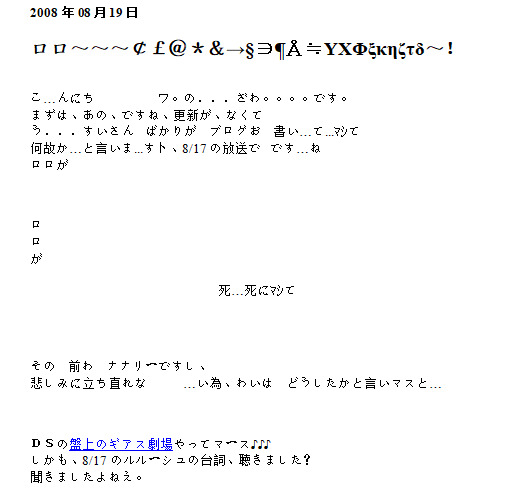
“Good... mor ning. It’s No... zawa... First, um, yeah, I haven’t posted updates. U.... Usui san is the only one who... was... writing... If you’re... wondering... why, on 17th August’s broadcast... Rolo Rolo d... died”

“You can see Rolo in the advertisement... (tear)”

“Lelouch’s emperor outfit... I wanted Rolo to see it” ----- It’s nice to know the staff was allowed to openly fangirl about their favorite characters. Although we already knew that from Sakou-san...
10 notes
·
View notes
Note
what do you think about the aang is possessive comment? about EIP ruining kataang? also about there being an implied (and nonexistent) love triangle thrown in nearing the end of the series as a tease?
I think fandom just likes to complain, lmao, but I’ll address each of these one at a time!
1) “aang is possessive”
This argument is honestly the most ridiculous thing I’ve ever heard because it’s just so obviously false?? Possessive is literally defined as “demanding someone’s total attention and love,” which Aang never does? Aang always respects Katara’s position in their relationship, especially after the EIP kiss, which everyone knows was entirely inappropriate and wrong of him. Aang recognizes her hesitation and makes no more romantic attempts towards her after that moment. Not one! Katara is the one who initiates them getting together in the finale because the war is finally over and she is no longer afraid of losing him. I beg people, do point to the “possessiveness” you’re referring to, because the closest we get to any character being possessive is Zuko in “The Beach”:
Zuko: [Side-view of Zuko and Mai walking.] He thinks he’s so great. [To Mai.] Well, what do you think of him?
Mai: I don’t have any opinion about him. I hardly know him.
Zuko: You like him, don’t you? [Mai sighs and walks away.]
//
Ruon-Jian: What are you doing?
Zuko: [Close-up. Angrily.] Stop talking to my girlfriend!
Ruon-Jian: [Side-view. Walks up to Zuko.] Relax. It’s just a party.
Frontal view of Ruon-Jian. Zuko knocks him across the room into a vase, which breaks from the force.
Yeah, Aang never acts like that. 🤷
Now, this isn’t to say Aang doesn’t get jealous. Jealousy is a perfectly normal and natural emotion, and honestly I’d go so far as to say that everyone has been jealous at least once in their life. What’s key about Aang is he doesn’t act on his jealousy. He doesn’t throw anybody across a room, for one. Sure, he doesn’t want Katara to kiss Jet, so he makes a little quiet comment about it. Pretty normal, and it ends there. Not dissimilar to Katara’s bit of snark about On Ji! Even the EIP comment, which everyone uses to argue that Aang is “possessive” (which again, blatantly untrue, because he does not demand or expect a relationship with Katara as a result of that scene; also all he does is nod lmao and tbh that’s such a healthy reaction to jealousy I mean he doesn’t grab Zuko and chuck him onto the stage like his name is Ruon-Jian, does he?) - Aang literally just gets upset about the implication from an imperialist play that Katara doesn’t reciprocate his feelings. Why?
Let’s be frank: Aang knows, or is fairly certain, that Katara does like him by this point in the series. That’s why he doesn’t ask her “do you like me”. Instead, he asks:
Aang: But it’s true, isn’t it? We kissed at the Invasion, and I thought we were gonna be together. But we’re not.
By this point the show, the viewers know their feelings are mutual. Katara knows how Aang feels about her, and Aang knows Katara likes him, too - he just isn’t sure about how ready she is for a relationship. So him getting upset about the propagandist, pro-imperialism play implying Katara isn’t interested in him, when he essentially knows she does like him, is honestly kind of understandable? Imagine if you were watching a really rude movie about your life and it included a scene of your best friend who you’re already kind of in a relationship with saying that they’re in love with the dude who used to bully you and only think of you as their sibling. Like, that’s kinda wack? I’d be a little upset - and definitely weirded out - too.
(I’ve also seen people argue Aang leaving Guru Pathik to save Katara also somehow demonstrates his so-called possessiveness, as if his love for her and her love for him wasn’t established mere minutes earlier to be the love of the Air Nomads reborn. I don’t think the show could have been any clearer about how mutual, powerful, and honest their love is through that scene. Also, he proceeds to let her go to enter the Avatar state at the end of what? The next episode? So again, any arguments that he was “possessive” and “didn’t let her go” are thus moot and entirely inapplicable points.)
Basically, Aang isn’t “possessive” and people who think he is are just looking for an excuse to hate on him, lmao.
2) “eip ruined kataang”
The only way EIP could have ruined Kataang would be if all the previous Kataang buildup was either terrible or near-nonexistent. And great news! Kataang was built up very well throughout the series, growing from a close, deep friendship to cute, blushy crushes to a true, lasting romance (pretty iconic of them). Even if someone doesn’t ship them, they can acknowledge that within canon, Kataang had a very strong foundation (it’s one of the core relationships of the show, the other being Zuko and Aang as narrative foils). The implication that one poorly written episode somehow cancels out the previous 56 episodes and the following four is embarrassing.
Now, I certainly wouldn’t have minded if there had been a scene dedicated to Aang and Katara discussing his poorly-timed kiss. I ship Kataang, so there is absolutely no reason for me to be opposed to more Kataang content! But A:TLA has a very clear trend of not showing such discussions on screen - example: Zuko never sits down with Katara and apologizes for using her mother’s necklace to manipulate her; Katara never apologizes to Sokka for her callous comment about their mother - so the fact that Katara is the one to initiate their relationship at the end of the serious clearly demonstrates that she has forgiven Aang for his inappropriate kiss and is ready to be with him. (And I’ve said it before - if she can forgive Zuko for all the shit he put them through, she can forgive Aang, her best friend and the guy she loves, for one poorly-timed kiss.) Narratively speaking, ’twas resolved.
Also, it’s incredibly important to consider EIP within the context of the series as a whole. If someone really feels entirely devastated by that one episode, then… their loss? I’m sorry to hear it? 56 episodes of near-flawless buildup - a slight dip + a healthy, logical finale where Katara chooses to be with Aang because she is at last no longer afraid of losing him = more than good enough for me. People can argue her decision doesn’t make sense all they want, but it actually makes perfect sense when you consider what has been built through every previous episode: she was in love with him! You can’t isolate a single episode and expect it to speak for the series as a whole, after all.
Basically, EIP gets blown out of proportion because some people like to pretend it was the only Kataang episode ever written, lmao.
3) love triangle
I always laugh when I see this because where?? The only love triangle in A:TLA was the one fandom invented. Within the canon narrative, Katara and Zuko were never romantically interested in each other. I don’t care about “shipping-goggle interpretations” or AUs or post-canon or early planning that didn’t make it into the final drafts. If you look at A:TLA, if you look at the creators’ intentions, it’s plain as day that Kataang and Maiko were the only romantic pairings planned for Katara and Zuko. And that’s okay! That’s why fanon exists. But people have got to stop whining about a love triangle and ship teases that just… didn’t occur. If they read Zuko and Katara’s interactions as romantic, well, that’s great and all, but it’s also on them, lol. That sounds so mean oml I’m sorry y’all 💀. I just mean that Kataang was very clearly written into the show from episode 1 and Maiko from Book 2 (or Book 3 if you really, really don’t like the flashback), so expecting Zuko and Katara to get together doesn’t make any sense (to me) when they never had any romantically-coded interactions.
Yes, of course I’ll admit there were a few Zvtara gags, but that’s exactly what they were - gags. There’s three primary instances:
- June calling the owner of the Water Tribe necklace (whom we know is Katara) Zuko’s girlfriend in Book 1. This moment is mainly hilarious because Zuko promptly redirects the conversation to Aang, lmao, but thinking about the context of A:TLA itself? The assumption of the Fire Nation crown prince being in a relationship with someone from the Water Tribe is honestly pretty concerning given how the Fire Nation is an imperialist conqueror and has all but destroyed the Water Tribes (and has certainly worked to sever the connection between the North and South). So, not exactly a great conclusion on June’s part.
- The EIP gag. I ALWAYS laugh at this one because their reactions are so funny? I love the little disgusted nose wrinkles and scooting away. That’s hysterical to me. But again, thinking about the show itself, EIP is an imperialist play full of Fire Nation propaganda. With that in mind, again, the implication that their crown prince was with someone from the SWT, a nation they brought to its knees by killing all of the waterbenders (but one) and thus eradicating so much of the SWT’s culture? Major red flags! People need to consider the implications of EIP as imperialist propaganda, basically, because that’s what it is. Ignoring that aspect means missing the entire point of the play.
- June part 2. What I said above still applies. Also, they both get embarrassed and hotly deny it, which is kind of the opposite of a ship tease to me? They don’t exchange like an “oh, but what if” glance or anything, lol. And June backs off immediately, so... 🤷
People who interpret that as serious ship teases are, bless their hearts, a little misguided. Those are just funny moments! It’s like Katara and Sokka dressing up as Aang’s parents in “The Headband”. It’s funny! It’s contextual! Sokka and Katara are not romantically interested in each other just because they dressed up as husband and wife (ew), just as Katara and Zuko aren’t romantically interested in each other because there were three jokes about it. I really don’t know what else to say lmao.
Now, I don’t know all about what Bryke did outside of A:TLA in regards to Zuko and Katara’s relationship and fans of it. I wasn’t here for that lol. But I do know that A:TLA built a beautiful, platonic bond akin to surrogate siblings between Zuko and Katara (highlighted by the final Agni Kai with Katara and Azula as foils). Not a love triangle. “The Southern Raiders” was an episode about Katara and Kya, not Zuko and Katara. “The Crossroads of Destiny” paints an aching, gorgeous parallel between Oma and Shu and Katara and Aang, not Katara and Zuko. “The Boiling Rock: Part 2” was an episode involving the loyalty and love of Mai and Zuko, not Katara and Zuko. Katara and Aang had romantic parallels, Mai and Zuko had romantic parallels, while Katara and Zuko - within canon - had strictly platonic development. And honestly, fandom should appreciate that more! How often do we get such an iconic relationship between a guy and a gal that isn’t shadowed by romance? (The answer: not often enough.)
Now, this doesn’t mean don’t ship Katara and Zuko. I don’t care what people ship lmao, and there are some interpretations of Zvtara that I really enjoy (post-canon Zvtara has so much potential,, I die a thousand deaths oml)! But insisting there was some love triangle thrown at the end of the series is a discredit to how well Aang and Katara’s and Zuko and Katara’s relationships were written in A:TLA, and I’m honestly tired of hearing such tomfoolery. A romantic relationship between Zuko and Katara within canon would have completely undermined his entire redemption arc, which further emphasizes that their canon bond was meant to be solely platonic, because why would the writers want to undo what most consider the best redemption arc in animated history? (Simply put, I don’t think they would.)
Also, A:TLA had a very clear history of staying away from love triangles. There’s no Aang x Katara x Jet love triangle. No Yue x Sokka x Suki love triangle. So why would there be an Aang x Katara x Zuko love triangle?
Case in point: there isn’t. Fandom invented it.
So that’s my thoughts, anon! It can be summarized as this: fandom makes up a lot of nonsense that simply rewatching the show can dispute, so maybe we should just start providing episode timestamps to people, lol.
A general note - people are free to disagree with this post, but I ain’t looking to argue, so… make your own post if you want to develop a “counterargument”, I guess? I’m just chillin™ lol I don’t want to fight with people. I can give you my PayPal if you’d really like to engage in a proper academic debate? Anyways. Much love! 💕
#adding the line break after i post!!#katara#aang#zuko#atla#avatar the last airbender#kataang#atla meta#the ember island players#amy answers#anon#amy analyzes
117 notes
·
View notes
Text
You know, I’ve been replaying the Ace Attorney games lately. At first I was bored and out of nowhere, I redid Dual destinies just because I hadn’t in a long time. Which led me to play the first game again (mainly for the Edgeworth case I love it so much tbh) and I’m now replaying Spirit of justice.
And...I can’t help but absolutely love those games because. It’s just so easy to hc everyone - and bu that I mean absolutely everyone important - as arospec! In canon, Phoenix does have one (1) romantic relationship at one point but I’d like to point out that one crush in your life does not make you alloromantic. Given the context I’d say either greyro or heteronormativity? I guess he can’t really be demiro but he could also be recipro (with the context again. Recipro does sound particularly consistent though). He doesn’t have any other romantic stuff even hinted at him! Pearls wants to believe Maya and him are dating but it always makes them 100% uncomfortable (the age gap people. Also, siblings dynamic). Pearls is kinda brainwashed by TV but hasn’t ever expressed interest in romance for herself, even her older self.
Edgeworth doesn’t have any interest in romance either. And I know he’s often shipped with Phoenix (I learnt about that quite recently actually-) but...even outside of my “I’ll make everyone aro if I can” motto, I...never shipped them romantically, even before I learnt of aromanticism. I like their dynamic, and how it’s implied Edgeworth opened up more (to everyone) after his trauma got relieved a bit. I want him to act like a stupid kid around his friends. Like, I can acknowledge Phoenix and him have a special bond, but someone special doesn’t mean it’s romantic and. Edgey’s emotional development got stopped after he parted with Pheonix and Larry so there’s that to consider too. This is the kind of bond of trust that can’t be broken and I find it beautiful, but I’m also pretty sure it would be unhealthy to only rely on one person, regardless of the nature of the relationship.
Apollo? Doesn’t have a romantic subplot. I guess there’s Junie who’s got a thing for him but he doesn’t reciprocate - and I relate to him not even being aware of it lmao. He’s so oblivious around romance, if he’s not arospec who is.
Athena? No romance in her life. She’s a lot like Phoenix (in her past trauma and her reason for doing the things she does) and I love her. Also, if someone ships her romantically with Simon, then I hate that person and will steal their bed. They’re like siblings and have like, a 10 years gap.
Trucy is the sun and doesn’t know what romance is. She’d use it as a magic trick and burn it/make it disappear into her magic panties (actually please do that Trucy, I beg of you).
Well, I could also mention like, Gavin, I guess he’s just a flirt but I don’t think it really means anything, romantic-attraction-wise. He’s also too cool to be straight to i’m going to make him aro. Though I don’t have a consistent HC for him outside of “not straight” if I’m being honest.
And it’s not even like romance doesn’t exist in the AA universe! Larry’s the straightest guy to ever straight (he’s harmless but outside of that...) and the cases often have romantic subplots and all. Well, not *that* often, and it’s generally the cause for murder but still. It’s a thing, it exists. Also we have a canon WLW in Dual Destinies and she’s one of the rare romance-havers not to be a culprit! She’s not the best, like she def has anger issues, but it’s all explained and understandable. She also loves her brother very much and deserves good things and therapy.
ALSO
I really, really love the dynamic of Phoenix’s found family? You have Maya, Trucy, and Pearls (and I guess Athena and Apollo are part of it too but they arrive later and have less interactions so). Pearls is Maya’s cousin, but otherwise, no one has any blood relationship in their little family. No romance needed. Phoenix adopted Trucy (and is apparently doing a great job) and babysits Pealrs and Maya. They’re all free of doing whatever they want, and they know they’re always going to come back together. It’s a found family but, not the “nuclear family” way, you know? Maya definitely isn’t acting as Trucy’s mother, and more like Phoenix’s sister I guess (Trucy and Maya do lack canon interaction but I always felt like said interactions were implied). I love their little family and the freedom in it. It’s just so healthy.
The last thing, not aro related, but still great and why I love those games-
Mental illness. I’m not saying it’s great rep, I don’t think it is, but...it’s just, so refreshing that you have characters with mental illnesses and issues that aren’t bad people. They aren’t the culprits, and, like in real life, are more likely to be victims. The diagnostic is never given in the game, but Edgeworth’s trauma? Not mocked. He definitely has PTSD, and, his fear of earthquakes? Wondered about, but not mocked. I guess that’s part of the reason I always go back to his case in the first game: to hear someone you care about, someone you trust, tell you: “I believe in you. I know your mind has been lying to you the whole time, and I’m here to say it’s okay. Those are just lies. Even when you stop believing in yourself, I’ll still believe in you.” That’s just so powerful, I can’t help but feel emotional every time. Add to that the fact that this bond isn’t romantic and. Yeah.
For Athena’s trauma, it’s the way it’s displayed I really love. Her game is much more recent, and it shows. She just blacks out when her PTSD gets triggered and no one shames her for that. Even though no one knows what’s happening inside her head for the longest time. She needs to be brought back to her senses, to be grounded. It’s not like she gets to have therapy on screen or anything, no character really gets a lot of time off the courtroom anyway, but given the context, I found she was treated in a very sensitive way.
The last example I can think of, is a character with DID. I say DID, but I doubt that’s good rep, and that’s probably not the way people with DID experience life, but that’s what’s said in the game so...Anyway, they’re a witness and, if you know how AA games work, the real culprit is *always* a witness. And you know how in pop culture, people with multiple personalities are often treated as villain, with the “hidden personality” no one knows about, not even the person, and this hidden personality is a murderer? I was sooo afraid the game was going to go that way. They even did hint at it, with giving the character the “hidden personality”. Except, the “hidden personality”, much like all of the other people of the system, is...100% harmless. And just that was so refreshing. Which goes to say a lot about the state of the rep for mental diversity. I don’t know the reality of experiencing DID, but in the game the witness interacts with themselves, and everyone in the court speaks to each individual differently, and the witness isn’t treated as delusional.
Those characters are accused wrongly of murder, when in reality they haven’t hurt a fly. And exonerating them is key to solving the case at hand. I don’t know who’s responsible for that, but I’m extremely grateful to them. To explicitly have your main character, the character you’re playing, clear the name of the mentally ill characters? It’s a blessing and not something you would expect from a game that named one of its recurring characters “Larry Butz”.
Anyway, I guess I am kinda trying to convince some of you to play those games (and goof about it with me) in this post. Even though it wasn’t my initial intent. If all of this isn’t enough to convince you - play those games for the awful puns. The characters’ names are terrible. Also I know I mentioned romance existing but weirdly enough it wasn’t annoying? Probably because it’s actually downplayed a lot. It’s only relevant as a plot device and it’s just like. Stated. Not dwelved deeper into. Those games are great for when you’re romance tired.
#my post#fandom#aro hc#long post#I can't believe I'm getting back into AA#when i'm already in the middle of getting back into saint seiya#i'm going to seriously lack time with school#oops I know this is an aro blog but I'm way too passionate#and had nowhere to speak about it#though I'm sure this not-aro part will resonate with some of you!#hope you don't mind i just get really excited about those games at least once a year
35 notes
·
View notes
Text
⚜️Laissez les bons temps rouler⚜️
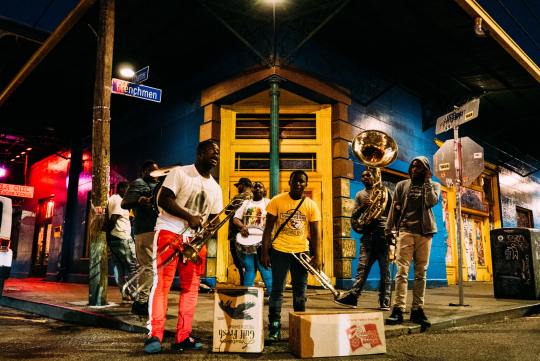
I just love this photo. In the words of my cousin Toosie: “It’s SO New Orleans!” Haha, but in all seriousness, if I had to choose one photo to describe my hometown It’d be this one above. In all the cities I’ve traveled to, I have yet to come across a place where you hear live music on every other street corner. Yeah some cities may have blocks and blocks of houses painted in bright, lively colors... and some cities may even have their own unique cuisine to offer! But no city – and I mean NO CITY – comes alive with music and dance like New Orleans!
This quarantine period has me seriously missing my city, making me WISH I took the chance to fly from Madrid back home before we hit beaucoup case numbers! I mean, I was missing it before... but now? MY LORDT!!!
As a means of quelling my yearning for Nola (”New Orleans, LA” for short), I’ve decided to dedicate this post to some terms and phrases influenced by (mainly) French that we still use today – New Orleans slang, if you will.
“Beaucoup”
I don’t know if any of you caught my usage of this word earlier in the post (it’s bolded and italicized), but this word is an actual French word for “much” / “many”. We always use it in a negative context to express an overwhelming amount of something, and it’s always placed in front of the the noun it’s describing, as in French.
Ex. “Stop bothering me boy; you know I got beaucoup things to do!”
“Banquette”
This is a diminutive of the French word “banc”, which means “bench”. However, somehow throughout the history of language exchange it came to mean “sidewalk”. In fact, my mom, her parents and her siblings used to use this word all of the time.
Ex. “Stay on the front yard, and don’t go past the banquette.”
“Bayou”
Coming from the Choctaw word “bayuk”, this word has transitioned into Louisiana French (also known as Louisiana Creole) as the bolded and italicized word you see above. It refers to a slow-moving body of water found in swamps.
“Bébé”
This is the French word for “baby”. Now we don’t go around spelling “baby” like it’s French counterpart, but I wrote it like this because this is how we pronounce the word. When pronounced like this, it’s more often than not used as a term of endearment for everybody – and I mean EVERYBODY. Doesn’t matter your age, gender, life experience; when you come down here get used to being called bébé, because that’s the only thing we’ll call you by. But no worries! That just means we actually like you!
“Cajun”
Having been derived from the word “Acadien” (French demonym), this term was once used to name the French Acadians who escaped British rule in Canada by emigrating to mainly Southwest Louisiana; now we use use it to refer to the descendants of those people. We also use this term in tandem with food, music and other cultural aspects that came from the Acadians and their descendants.
Ex. “How do you expect me to survive without my cajun spices!? I can’t eat anything unless I have my spices!”
“Do-do / Dodo”
***Pronounced like “DOUGH-DOUGH”
Some of you may remember this word from my Stromae post! This term is derived from the French verb “dormir” or “to sleep”, but is also used as a verb to mean “sleep”. I first learned of this word from a lullaby my mom would sing to all of her children, and even her grandchildren. My older brother used to say it to my nieces when they were infants:
Ex. “Okay y’all, time to go do-do.”
“Fais do-do”
Yet another word from the Stromae post! It actually means “go to sleep”, but it’s transitioned to Louisiana Creole to refer to a (usually) Southern Louisiana Saturday night dancing event for adults, an event during which children were supposed to be asleep.
“Lagniappe”
Derived from the Spanish “la ñapa” (”a little extra of something”), this is a Louisiana Creole term that shares the meaning with its predecessor. Fun fact: a middle school Louisiana history textbook of mine would have lagniappes off to side of some pages in each chapter that displayed some extra information related to that chapter’s theme.
“Laissez les bons temps rouler!”
Aaaah the title of this post. This is our city’s motto that can be heard at literally any event, whether it be a neighborhood second-line, the New Orleans Jazz & Heritage Festival, a Saints football game, etc. It means “ʼLet the good times roll”.
“Let me learn you something–”
This is an older saying – therefore not heard as much these days – that my mom, her siblings, parents, etc. would say to each other whenever they needed to address/clarify something in an assertive manner. Due to the combination of this phrasing being more associated with something that’d come out of the mouth of a Black person and it not being the standard way of signaling that something needs to be addressed, it’s considered “bad English”... which it isn’t since there’s no such thing as “bad English”, but I’ll get into this on another post. ANYWAY, I included this expression because I came across it’s French counterpart in one of my French textbooks about a year ago: “apprendre quelque chose à quelqu’un”, which literally means “to learn something to someone”! To those who may be confused on how to interpret the meaning of this expression: the standard version is “Let me tell you something–”. I’ve yet to find anything on the internet to properly connect the English expression in bold and the French expression, but I find it hard to believe that the English expression would not have resulted from language contact, like several words in this list thus far.
Ex. A: “I can’t BELIEVE you told them something that was supposed to stay between us!”
B: “Let me learn you something: I’m not a blabber-mouth like a certain person, so whoever told your little secret is clearly someone who was eavesdropping.”
“Making groceries”
This is a Cajun English expression that was directly translated from the French phrase “faire l’épicerie”.
Ex. “I have to make groceries, so I’ll be out for a little while.”
“Mardi Gras”
Y’all should know what this is already... but if you don’t!
Literally meaning “Fat Tuesday”, Mardi Gras is carnaval season for us Louisianians. It always occurs on the Tuesday before the Lent season begins, which is on Ash Wednesday, hence the name Fat TUESDAY. Now as far as the FAT part goes: “carnaval” means “to flesh, farewell”. The purpose of carnaval is for practicing Christians to eat as much of the food they’d give up for Lent as possible, this food being meat or “flesh”. So it’s during Mardi Gras season when we break out all of the flavorful, fattening Louisiana dishes, especially our very own King Cake!
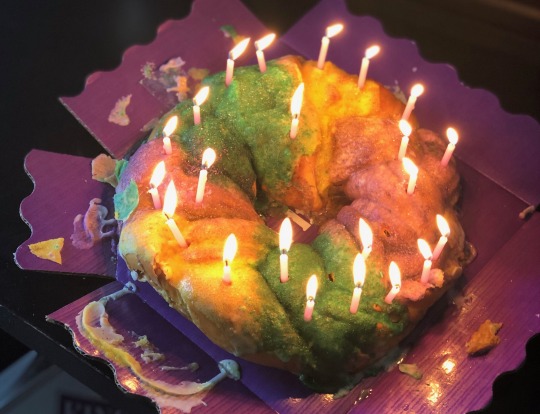
Fun Fact: this picture was from my birthday last year, which was on Mardi Gras Day, so naturally I had a King Cake for my birthday!
“Nainain” & “Parrain”
This isn’t as much of a trend anymore, but when my mom and her siblings were growing up they would call their godmother and godfather “nainain” and ”parrain” respectively. These two French terms are the direct translations of their English counterparts.
“Praline”
The name for this sweet treat made out of pure diabetes – yet still irresistible – comes from the Frenchman who created this sugary goodness, a Monsieur César, duc de Chioseul, or better-known as Le Maréchal du Plessis-Praslin.
According to Wikipedia there are 3 types of pralines??? Which I didn’t know was a thing. What I also didn’t know was a thing was that the praline mixture is more commonly used to fill chocolates out here in Europe... we just straight up eat pralines as they are in Louisiana, haha!

“Vieux Carré”
And last but not least! This is French for “Old Square”, the name that refers to the most exciting part of New Orleans: The French Quarter. Yes peeps, this is where you can find the famous(ly overrated) Bourbon Street, wedding second-lines, Café du Monde, po-boys, etc. Fun Fact: the exit sign we have i the city that directs us straight to the French Quarter is still called the “Vieux Carré” Exit!
Congratulations for reaching the end of this crazy-long post! I wasn’t expecting it to get this long... but I’m not upset! If anything, this post did its job: help quell my yearning for my city. Hopefully you can take away some new knowledge about my city and my heritage; I had a lot of fun making this post!! There are loads more of terms, names, etc. that I could have added to this post, but I figured I should just cap it at where we’re at. As always, if there are any questions, feel free to send me asks! Sources are under the cut, so click “Keep Reading” below if you’d like to learn more about Nola. Cheers!
Brass Band Photo: https://unsplash.com/photos/sEoR_ea8KoE
King Cake Photo: Mine!
Praline Photo: https://bernardscandy.com/product/original-pralines/
Louisiana Terms and Definitions:
http://www.experienceneworleans.com/glossary.html
https://www.crt.state.la.us/tourism/pressroom/almanac/glossary-of-louisiana-terms/index
https://www.wordreference.com
https://www.google.com
“Carnaval” Term Folk Etymology: https://en.wiktionary.org/wiki/carnaval
“Praline” Term Etymology and History: https://en.wikipedia.org/wiki/Praline
#French#Français#Vocabulary#Vocabulaire#Grammar#Grammaire#Colloquialisms#Black Linguist#NOLA in the house#⚜️⚜️⚜️#Langblr#Studyblr#Original Post
2 notes
·
View notes
Text
Overall thoughts on Les Mis BBC
I decided, after all those summaries I made, to write what I hope can be a more coherent opinion on what I thought of the adaptation as a whole. I wanted to make sure to state that my critical reactions weren’t for entertainment purposes only or exaggerated for the fun of it but based on real concerns I’ll expand in this post. This is like the “serious companion”, if you will.
I don’t know if anyone cares about it at this point, but I feel that even though my summaries helped me go through the immediate frustrations in a (mostly) lighthearted way, it’s the distance from having watched it all what gave me a little bit more clarity to order my thoughts.
I’ve established my opinion isn’t worth a damn, I’m not smart or knowledgeable enough for this fandom and, needless to say, these are all my personal opinions, take them with a grain of salt or a bathtub of it. I’m a worthless nobody and my words have no value, but the internet is still (sort of) free, so here I go.
Introduction: the initial news, Andrew Davies & the PR mess
BBC announced the adaptations of 2 media phenomenons which started as books that I love so much I’m considering tattoos of both. And, for both of them, my main concerns were on the person adapting the script.
On the one hand, there’s His Dark Materials, a book series that made me the person I am today, pretty much. One of the directors is none other than Tom Hooper (what are the odds) and the script adaptation was in the hands of Jack Thorne. Cursed Child Jack Thorne. Yeah, not thrilled about that.
Surprisingly enough, His Dark Materials was given a projection of 3 possible seasons, rather than just one, the 3rd hasn’t been yet confirmed but the fact that the script was made thinking on one season per major book on the series, and that each season has 8 episodes planned, at least gives me a bit of hope, even if the person adapting it isn’t in my favorites list.
Les Mis, on the other hand, went to the hands of Andrew Davies, another person I don’t trust.
I’m one of those folk who was never too fond of the ‘95 version of Pride and Prejudice, mainly because of how Darcy was made into a sort of sex symbol, where his flaws were seen as “attractive marks of broody character” rather than vulnerability and with gratuitous sexualizing fanservice. I know a lot of people love it for that and that’s cool, you do you, but it’s not for me.
Then, when he adapted War and Peace, he talked about adding more sex to it and had the Kuragin siblings shown explicitly sleeping together from the get-go in episode 1 and that’s when I stopped watching (there were other things I didn’t like but that one was my limit).
To make matters worse, it made me weary that Les Mis was getting an overall amount of only 6 episodes whereas HDM was getting a potential 24-ish. That was an odd choice.
So, as you can guess, I knew coming in that Davies writing the script, a script with a limited time-frame for the story, was a huge risk.
But, on the other hand, as the cast was announced, I got excited. Especially for people like Archie Madekwe, Turlough Convery, Erin Kellyman and some famous actors like David Oyelowo. Their filming logs on social media, how nice they all were and how much fun they had filming made me happy. I felt that maybe these great folks could turn around whatever the scrip had to disappoint me.
But then came all the PR stuff.
The more I read Davies & co. talking about the show, the less hope I had for it. Talking very badly about the musical and the 2012 movie, calling female characters “not complicated”, insulting Cosette, saying that Javert’s lack of explicit heterosexual sex in the brick was reason enough to push a homosexual narrative centered on an unhealthy behavior, patting themselves on the back for having a diverse cast as if no other adaptation of Les Mis had ever done it before...even their talks about Fantine’s make up made me weary. And, let’s not forget their ridiculous insistence on not having songs.
By the time the show premiered, my hopes had dwindled. The excitement I had upon knowing there would be another Les Mis adaptation so soon, a BBC one at that, and with a cast I had hopes for, was blurred by all the nonsense of PR and I was more afraid than hopeful.
In the end, after having watched it completely, and as you can see for my summaries, I was heavily disappointed. I’ll try to list some of my biggest concerns, in no particular order.
I can’t be super extensive about it, because there are a lot of points to go over, but there are a lot of amazing opinion pieces out there about specific issues, so you don’t need me for that.
Anyway, let’s delve into some of my biggest problems with BBC Les Mis.
Problem #1: The portrayal of femininity
Solely by the fact that Davies stated that women on Les Mis “are not terribly complicated” you know that things are not going to go all too well on that front.
I’m going to pick 3 characters to showcase how badly women were portrayed in this: Fantine, Cosette and Éponine. I’ll leave other characters for another section.
1. Fantine
I’ve talked about Fantine before, upon receiving some questions on my summaries, but I’ll try to explain it all in a more understandable way.
The lens in which Fantine was seen was sexist from the get-go. The way in which the story was framed made the audience complicit in the choices she was making, choices that were negatively regarded by the narrative perspective alone. Her “fall to disgrace” was framed as her own decisions being incorrect, silly mistakes that were easily avoidable, and never regarded as the result of living in a society that was unable to contain her and see her as a valid human being. But we’ll get to that when we talk about the politics (or lack thereof) on this show.
Like I said in my response before, the way in which Fantine is portrayed, even in the musical itself, varies greatly performance to performance. Patti LuPone performing I Dreamed a Dream after Fantine gets dismissed isn’t like Anne Hathaway performing it after she has become a prostitute and neither carry the same implications as Allison Blackwell in the Liesl Tommy’s Dallas modern production, influenced by her experience in apartheid South Africa.
Still, the key element to developing Fantine’s portrayal, when it comes to sexism and the showcasing of her environment, has two layers: the actual oppression showcased in the source material and the contemporary interpretation or lens in which an adaptation will view it.
In this version, Fantine’s character was toned down in her attitude. She was less reactive than in the brick, a lot more passive, a lot more of a tragic figure, which paired up with the fact that this adaptation covered her entire “fall to ruin”, from meeting Tholomyès onward, made her a victim of everything that happened to her.
A victim of her own bad decisions, though, not of a social context that was failing her.
But the worst part is in how the focus of the show is placed. You can have Fantine being a summarized version of herself, with less spunk, and still showcase through her that the circumstances she was in were permeated by an escalating force of social disadvantage and oppression.
This adaptation made, like I said, the audience complicit in Fantine’s decisions as if she was a princess in a movie, unaware of the threats she was getting herself into by her own naive foolishness.
Tholomyès is blatantly shady, clearly dishonest, not at all charming or in any way trustworthy and Fantine gets a “voice of reason” on a friend who tells her various times that he will eventually leave. There are a lot of red flags, blatant for the audience, that Fantine chooses to dismiss. The show focuses less on why Fantine trusted Tholomyès and more on her making a clear bad choice we all knew was doomed from the start.

This becomes a problem once again when she chooses to leave Cosette with the Thénardiers. They are very clearly shady, very blatantly aggressive and ready to take advantage of her, visibly manhandling Cosette in front of her and asking for more money on the spot, and Fantine again naively ignores all of this.
They do it again when she enters employment in Montreuil. She talks to Valjean himself in this version, and is asked repeatedly and with kindness if she has a family. The scene makes it seem as if she could have easily told the truth, especially because we were previously given a scene in which Fantine hears a speech talking about how Valjean is the Best Person Ever and could potentially help her. Still, she chooses to repeatedly lie and the show makes it seem less for necessity and more for a sense of pride of some sort.
(Also, as a foreshadowing of creepy Valjean to come, there are some insinuations from her co-workers that she could seduce Valjean, which is confusingly placed and awkwardly added where it is.)
Then, after she’s dismissed, there’s a man in a post office who asks her, after receiving letters from the Thénardiers (to which she reacts a lot more passively than in the brick), why she doesn’t bring Cosette to live with her, in a condescending tone, as if he was stating the obvious. Fantine responds again as if she was doing it out of pride. The same man is the one to suggest her to start selling her body and then tell her she should have done it before selling her hair and teeth because “nobody would pay for her after that”.
Every turn we’re met with ways in which Fantine’s decisions are seen as foolish in the eyes of the viewer. It’s like Blue’s Clues or Dora the Explorer when they ask stuff to the audience for the kids to say they shouldn’t do something. It’s patronizing as fuck, is what it is. And, yes, sexist.
These narrative choices are sexist because they erase most of the social and political situation which made Fantine vulnerable in the first place, to push the tragic drama as if she was a victim of being “too naive”. It’s sexist because it makes the audience know from the get go that what Fantine is doing is a “bad choice”, easily avoidable mistakes that whoever writes is smart enough to sense are bad but poor naive Fantine can’t understand.
It isn’t just that she’s called a whore a lot of times, that she’s smashed against walls and the ground hard enough that Lily Collins was actually hurt, that she’s shown explicitly being used by a patron on the street. It’s that all of it is done with the added layer of her having “chosen wrong”. That everything is framed as the consequences of actions that the narrative voice, as well as the audience, are smart enough to know are wrong, but poor little Fantine can’t handle.
Like many things in this adaptation we’ll see later, Fantine’s journey is framed more like the tragic end of a woman who didn’t know how to choose right and was punished for said choices rather than the result of an unfair society which didn’t allow women any freedom to choose and didn’t see them as worthy human beings.
2. Cosette
When Andrew Davies called Cosette a “pretty nauseating character” in need of change, I knew I was up against one of those people.
Cosette is probably one of the most underestimated female characters in literature, and adaptations tend to do her dirty very often. I’m not even fond of her interpretation in the musical all that much, which goes in tow with the interpretation of Éponine. I’ve seen my fair share of men on youtube claiming Gavroche should be the face of Les Mis rather than Cosette, I’ve received my fair amount of messages claiming she’s The Worst, I’ve seen it all.
This adaptation does with Cosette something that, out of context, I would have thought impossible. They manage to somehow attempt to make her more “active” (they would call it “strong” but I have problems with that denomination) while making her even more of a helpless victim. It’s a pretty impressive oxymoron.
Let’s begin with little Cosette.
This adaptation does something very weird in that it only showcases Cosette’s storyline as a child when it serves other characters, but then intends to build upon the abuse by mentioning it or making it clear that adult Cosette remembers it well.
So we see Cosette when she’s important to Fantine’s storyline, the Thénardiers’s storyline or Valjean’s storyline, but not much about her on her own, aside from one time she’s looking at dolls and another time when she’s being beaten up by Madame Thénardier, which could be also a moment for the Thénardiers and not solely for Cosette’s narrative.
What I mean with this is that the view on her is reduced to a side character rather than a main one and, with that, her perspective on her own abuse isn’t taken into account. You don’t know how Cosette feels about things, you don’t see her perspective on it, you only see what others do to her but never get to see her side of it. For all the musical erases of her narrative, at least they give her Castle on a Cloud.
It’s with little Cosette where we start to see this weird sense of sexually charged perception towards her relationship with Valjean.
For some inexplicable and highly alarming reason, it’s implied by various witnesses in different occasions that Valjean’s intentions with Cosette may be inappropriate, and I would have let it slide as just people thinking The Worst out of living in a social context in which The Worst is most often the truth, hadn’t that perception carried throughout the series and mixed with Valjean’s erratic and possessive characterization.
When Cosette grows up, she gains a bit more focus, but she also starts to be charged a lot more sexually.
Both Cosette and Éponine are sexualized and objectivized in this adaptation. This will be addressed later, but most often than not this sexualization acts as an accessory to a narrative about masculinity.
Cosette’s virtue, beauty and body are talked about and even exposed in various moments. They tell her she can’t be a nun because that would be “a waste of her beauty”. In that dreadful scene in the dress shop I talked about in summary 4, the shop assistant again implies that Cosette is Valjean’s lover and lets him see her in undergarments through the curtain, with clear intentions. Valjean’s erratic persona is intent on separating her from Marius, explicitly telling her he’s worried that she will be taken advantage of by men, bringing up Fantine’s history to her with that in mind, while putting her in danger and in the company of the Thénardiers again, in more than one occasion.
Adult Cosette has visible signs of the trauma she suffered, which is an interesting direction to go. I haven’t seen an adaptation taking such a big route on her remembering her past abuse, and is a change that worked in performance, Ellie did some great visible responses like covering herself when Valjean wakes her up or going fight or flight every time she sees Thénardier. She is visibly upset when Marius gives him money and looks both angry yet still hesitant when she sees the man for the last time.
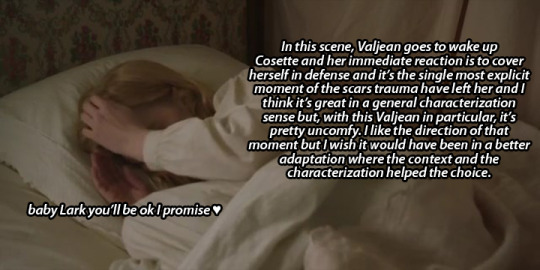
But all that kind of loses its importance when the men around her not only don’t give a shit but also do their worst.
Valjean manhandles her, harms her even, pushes her to the limits of her emotional state by taking her to see the prisoners intentionally after she mentioned prison, acting more possessive than caring and more erratically violent than conflicted and concerned.
Marius has a somewhat wet dream about her and then again dreams with her in confusing ways when he’s out of the barricade, with his grandfather talking about her as if she’s a piece of meat even after he meets her and she’s right in front of him.
They tried to make Cosette more aggressive, I think, more reactive, which in some moments worked. But when the lens in which she’s viewed is objectivizing, when she’s being commented on, offered and treated as an object, then it isn’t enough. It makes it worse, actually.
I’m sorry for Ellie, though, she did good.
3. Éponine
Much like Cosette, Éponine’s childhood was all but a few cameos. It’s very often that adaptations try to “tone down” Éponine in order to pull a narrative of her as an underdog in a love triangle, the “friendzoned” girl who tragically dies. The musical does that, for example.
Some of Éponine’s most controversial actions in the brick tend to be most often deleted or changed, except for adaptations in which she’s an “enemy” to Cosette’s narrative of a classic heroine.
It isn’t easy to find adaptations that are able to make Éponine showcase the complexity of her canon character not as a problem but as what makes her character so good and important in the overall story. Hey, even fandom sometimes tends to romanticize Éponine as if she had to be “redeemed” in order to be seen as a worthy character (but that happens a lot with female characters in general).
Éponine doesn’t exist for Marius’s narrative, as the other girl in a love triangle, or for Cosette’s narrative, as an enemy, she’s her own character with her own reason for existing and complex human dynamics that are extremely permeated by the social circumstances she’s immersed in and represents.
I’d say this adaptation is on the group that uses her for Marius’s storyline.
Added to that, it’s one of the worst I’ve seen on that case, because in this one, Marius is complicit of Éponine’s intentions, which are sexualized to a degree I don’t feel comfortable with.
We’ll talk a bit more about the Marius side of things later, but for Éponine, it meant she was reduced to a character that exists to sexually awaken Marius rather than a tragic figure on her own or even a piece of a love triangle. So, basically, this is the worst I’ve seen in a while.
This is clearly seen in that interview when Davies explained why he added that “wet dream” scene, saying:
“One of the best things Hugo does is to have Eponine tease Marius with her sexiness because he is a bit of a prig. So I have introduced a scene where Marius, even though he is in love with Cosette, has a wet dream about Eponine and feels rather guilty about it. I think it fits into the psychology of the book.” Source
Let’s leave out the part where he considers that to be “one of the best things Hugo does” because I cannot deal with that right now. Let’s focus on the other bit.
Like this quote suggests and I said before, Éponine was rather reduced to a tool for Marius’s sexual awakening. In this version, it isn’t only the “wet dream” which precedes more crucial interactions between Marius and Éponine, there’s also a scene where she strips for him through the hole in the wall and another where Courfeyrac is commenting on her and Azelma as Marius moves into the building for the first time.
By the time Marius gives her his money and any sort of bond can occur, it’s evidently clear in this version that Éponine has been teasing Marius and he is fully aware of it. He looks at her through the peep hole licking his lips and then has that disturbing dream where she’s kind of forcing him onto her in a very questionable way.
So, this Marius is by no means unaware of the fact that Éponine was attracted to him in some capacity and has played along her seduction, which makes his dismissal of her and his request for her to find Cosette a lot like he is using her for his own gain and replacing her for another girl.

Éponine’s attitude, much like Cosette’s, tries to be more active at times. She’s confrontational to her parents, seems protective of Azelma and is pleased to see her mother stuck in jail.
However, much like with Cosette, any kind of agency is compromised for having her narrative be serving a male character’s development rather than her own. Her involvement in the barricade is also somewhat modified but, by that time, her journey has already been substantially affected.
Much like Ellie, Erin was a very good Éponine when she was allowed to perform at her best and I wish she had been involved in an adaptation that was able to portray Éponine with more justice.
I’ll talk a bit more about women on the show in general in problem #3 but, for now, let’s move on.
Problem #2: The portrayal of masculinity
1. Javert
I am not the best person to write an essay on Javert, there are a lot of people more capable than me for that, and I may be called out for this and mess everything up, but I can’t write overall opinions without mentioning my issues with his characterization, at least summarized.
Javert is a complicated character. He is, as much as everyone else, affected by the circumstances and a man who goes through a huge emotional impact and sees his values questioned and compromised. His and Valjean’s journeys have a lot in common, in different ways and with different outcomes.
Sadly, Javert tends to be seen as a villain in a lot of adaptations. It’s a way to simplify the plot in the way movies tend to do: something is defined by what the other isn’t, if Valjean is the protagonist, then Javert must be his antagonist. I was worried that this version was going to fall into that trap, because of time restraint and Davies’s tendencies of simplifying complex characters.
Javert’s characterization was erratic, much like Valjean’s. His attitude was blurred by fits of rage and moments of confusing violence, followed by charged pauses in strange cadences which tended to fluctuate. I don’t think his attitude was as all-over-the-place as Valjean’s, but it was certainly not as well defined as other Javerts I’ve seen through the years.
This Javert, however, had a choice made for him that separates him from other versions:
Over tea in central London, Davies tells me that he was surprised to discover that, in Hugo’s 1862 novel, neither character [Javert or Valjean] mentions any sort of sexual experience, leaving the 82-year-old screenwriter wondering, at least in the case of Javert, whether it was indicative of a latent homosexuality. Source
There is a lot to unpack there.
First, there’s this idea of masculinity in which the lack of explicit heterosexual intercourse in canon is directly representative of homosexuality. I’m not gonna delve a lot in the brick but there are a good bunch of characters you can easily read as gay. Hell, there’s that whole thing going on with comparing Enjolras and Grantaire to greek couples. And if you want to write Javert as gay, go ahead, there’s a lot of fanfiction out there who is with you on that and I’m here for all interpretations, no problem at all.
But if you’re going to take that route, you need to be careful with your optics.
This Javert is, at the end of the day, in this adaptation, a gay man of color. He is also explicitly obsessed with Valjean in a way that exceeds his sense of justice. He looks at him undress in prison, is all over his personal space while he’s in chains and later interrogates him believing Marius is his lover, clearly attempting Valjean to confess to him if he was. He receives a lot of comments from an officer who touches him and looks at him strangely in the last episode, prompting an immediate rejection from him.
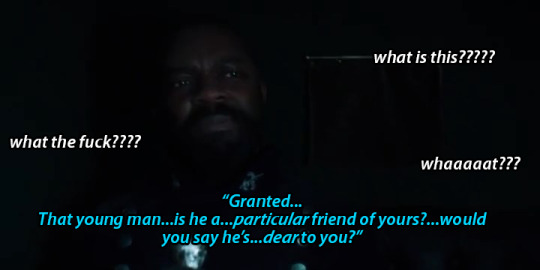
Everything points to Javert’s homosexuality being in the plot only as a further motivator for his need to capture Valjean, which makes for both a problematic portrayal of predatory homosexuality and a subsequent narrative of police abuse, both very problematic aspects to portray through a gay man of color. The way he acts and the way in which people act around him make it seem like his obsession with capturing him is fueled by the fact that Valjean represents his closeted feelings and that is all kinds of messed up.
He is also clearly not as involved in other aspects of the law as he is in capturing Valjean, since Thénardier ends up being a secondary worry to him, even explicitly knowing he has been mistreating and abusing a child, and he also explicitly doesn’t care about his achievements or the ones of his other officers as long as Valjean is on the loose. He lets Thénardier escape prison on his watch and doesn’t take care of it himself, prioritizing Valjean.
It isn’t about what happens in canon or not but in how all of this, in this version, is framed under this idea that Javert is also gay and has an obsession with Valjean that seems predatory in part, rather than fueled by his beliefs. And that is a dangerous optic to write a gay character under. Especially a police officer who is also a man of color.
I’m not the one to talk about that, it’s not my experience to tell and I’m not going to speak over those whose experience this is, but as a content creator, I’d question if my need to diversify is stepping over the lines of problematic aspects that may ill represent the identities I’m trying to integrate. Just saying.
David’s performance hits some very good moments, especially when Javert starts contemplating suicide. That is a very important scene in every adaptation and a very amazing chapter in canon and David does well in performing the turmoil in Javert’s decision. They also add, as a voice in off, the notes he left to improve the service, which is a great touch.
But, much like the other characters I mentioned, his performance is blurred by these writing choices in which Javert has been added this sort of predatory sense in which Valjean in jail symbolizes also keeping his identity hidden away. Davies would probably say his “desires” because that’s the kind of guy he is.
I hope my opinion isn’t overstepping anyone’s voice and I’ll leave the further of this discussion to someone more appropriate, but I felt it was an important matter to include and something we all, as media consumers, must pay attention to.
2. Marius
I had higher hopes for this boy, I really did.
The good thing this adaptation does for Marius is give him a bit more room than others do. They touch more on his relationship with his father and his grandfather, they bring up the Thénardier connection to his dad, they introduce Mabeuf, and they bring him on as a kid in the beginning, which even though questionable in comparison to him having more development as a child than Cosette and Éponine, at least helped to introduce him as another key character of the whole story.
I had hopes that this earlier introduction, albeit unfairly unbalanced with Cosette’s and Éponine’s, would allow for his character to develop more strongly, especially since politics were very present in his conversations with his grandfather and the ideals of his dad. I thought that by introducing politics through Marius that would allow his connection to Les Amis de l’ABC be more profound when the moment for revolution came.
Yeah, no, that didn’t happen.
Les Mis is a book where people are the heart and soul of it. With that in mind, characters aren’t like each other, they aren’t repetitions of the other’s attitude, they are diverse reflections of the complexity of humanity. The portrayal of masculinity in characters like Javert, Valjean, Gavroche or each individual member of Les Amis aren’t the same between each other, and neither are the same as Marius’s.
Marius represents a very wide emotional spectrum. He’s sensitive and vulnerable, passionate and driven, but at the same time can take action into his own hands when he has to and fight, even at the cost of his own life. There are layers in Marius. Like a Rogel cake.
I don’t want to generalize but a problem I have often with older male writers is that they see emotional complexity as weakness, especially when it comes to the portrayal of masculinity. There’s this idea in which something that is undefined or conflicting isn’t “strong” enough and therefore requires forcing.
Remember that quote I brought up for Éponine’s characterization? we’re going back to that. To Davies calling Marius “a prig” in need of being seduced.
Like I said, this version made Marius complicit in Éponine’s advances and aware of her sexually charged intentions, and this was made in an attempt to “upgrade” Marius’s masculinity and make him “less of a prig”. Because in order to be a Man, Marius needs to objectivize women. Apparently.

Like I mentioned, the gesture of Marius giving Éponine the little money he had ended up being a lot less effective by the fact that he had already fantasized about her more than once, and with her knowing that. He is taken to a brothel by Courfeyrac and Grantaire in which women pretty much throw themselves at him while he looks for Cosette. The “wet dream” he has is a very eerie combination of idealization and assault, in which Éponine, taking Cosette’s place, forces him onto her (much like Davies is forcing this onto Marius).
It isn’t about sex or eroticism being introduced to Marius’s storyline, is that they appear forced and almost violently thrust upon him in order to validate him in this idea of masculinity the adaptation seems to have, which seems to be very narrow.
And, with that in mind, we’ll move on to the last bit of this section.
3. Valjean
I am unable to write a piece about how many layers of wrong this Valjean embodied.
There are a lot of good tumblr scholars and Les Mis experts talking about it already, they can explain better than I ever could, but we need to, at least, try to glimpse at the mess this was, because this is a post on problems and this was a major one.
There are a lot of interpretations of Valjean, some of which are astronomically awful. He’s a character that can be easily fucked up, maybe because he also represents a very complex range of emotions, a very wide spectrum of masculinity, and is inserted in a wide variety of social contexts and spheres during his lifetime, which permeate his way of living as well as his agency to do things.
Any adaptation of Les Mis from the get go starts with the challenge of representing all of this in a limited time frame and with a limited perspective. It’s very difficult to translate not only all of this complexity but also all the thoughts the narrator can rely, all the feelings and conflicts and internal turmoil that we can get from the book because it’s written.
The musical, in that sense, has some elements from its medium that help, like the soliloquies, the changes of key, the ability for characters to bear their souls through song without interrupting the believability of the story.
Representing Valjean without a medium that allows a peek inside his head is a big challenge. He is a character whose turmoil is most often interior, so showcasing that externally poses difficulty.
Still, you can’t fuck up this much, my dude.
I’ve seen bad Valjeans in my life, this one is...complicated. He’s not good, don’t get me wrong, but he isn’t as clear-cut godawful as others I’ve seen, he’s too erratic to be easily described.
I think this adaptation tried to showcase complexity through visible emotional distress and physical violence. Instead of having a soliloquy or symbolism, we have Valjean shouting or screaming or burning his hand with a coin and staring at it for a while or shouting at nuns or carrying Cosette by force so hard her arm is in pain.
Everything gets even more confusing when everyone around him treats him weirdly.
You get years of exposition clumsily thrown at you via a speech Fantine hears when she arrives at Montreuil and he’s been elected. You get girls looking at him naughtily and suggesting Fantine to try to seduce him. You get inkeepers and Thénardier suggesting his intentions with child Cosette aren’t appropriate. You get women in dress shops thinking his intentions with young adult Cosette aren’t appropriate. You get Javert thinking his intentions with Marius aren’t appropriate. Everyone wants to talk about Valjean’s sex life or something, I don’t know.
His attitude towards Cosette is also muddled by this erratic behavior and the very strange way in which he sees her and Fantine.
He is visibly more worried about men taking advantage of her, of “defiling” her, than other dangers she could be in, like his identity being found out by the police or her falling in the hands of the Thénardiers again. He forcibly removes her from Marius’s presence and has a fight with her about it that ends on him taking her to see the prisoners. He knows she still, as an adult, visibly flinches when she’s approached harshly yet manhandles her when he wants to keep her locked up.
There’s something possessive about this Valjean that ties in to how Cosette is portrayed as an object. He talks about Cosette as if she was something he needs to keep, says Marius will “rob” her, not because he wants to be a good father or see her happy but because she is his to have.
This Valjean feels as if Cosette was his attempt to get rid of the guilt he feels for having failed Fantine more so than anything else. She’s less of a person and more an object he needs to keep for himself like a third candlestick. That’s the impression I got of their relationship with his characterization.

By the time the series ended, I felt upset with Valjean.
I didn’t care if he died, I didn’t care if he suffered. And that’s pretty shitty for a Les Mis adaptation to prompt. He made me feel uncomfortable, uneasy, as if he was the last person I would trust to take care of a young girl. And whatever internal journey he was going on wasn’t developed well enough to understand any of these choices.
I don’t know, like I said, I’m not an expert of the subject of Jean Valjean, but I’m pretty sure this is not how you adapt him.
Problem #3: Diversity without optics
This show hadn’t even started and it was already patting itself on the back for being diverse.
Now, if you haven’t been in the world of Les Mis for too long, let me tell you there are a lot of adaptations which are diverse, and not only of the musical. In itself, it wasn’t a pioneer move, but I was nonetheless happy that they were going to pay attention to that. At the end of the day, Les Mis is about society, about oppression, and adaptations of it should represent the diversity of the social landscape of the time and place they’re created in.
That being said, diversity in a highly political storyline needs to be carefully worked through, because without optics you can make questionable choices. And, you guessed it, questionable choices were made here.
I can’t and won’t go over all of the issues with this that there are, but I can give a few examples.
There is, of course, the always present argument of casting Fantine and Cosette white and the majority of the Thénardiers and Éponine as poc. And of casting the majority of Les Amis as white and the majority or most visible part of Patron Minette as poc. People have discussed this at length so I won’t go over that.
There is also how constantly woc were cast in roles of service, some of which were questionable given the context. Simplice, for example, is cast this way, which I overlooked at the time but as it kept escalating with other characters like Matelote and eventually Toussaint, it grew a bit more complex.
Toussaint was...a very problematic choice.
When you present the character of a “housekeeper” in a period series which is meant to represent France in the 1800s, and she is a woman of color, some alarms start ringing. I don’t specialize in French history, but my instincts were proven correct when I checked various sources on dates, after seeing the episode, and I’m quoting wiki for easier access here:
Slavery was first abolished by the French Republic in 1794, but Napoleon revoked that decree in 1802. In 1815, the Republic abolished the slave trade but the decree did not come into effect until 1826. France re-abolished slavery in her colonies in 1848 with a general and unconditional emancipation.
This series has a weirdly set timeline in comparison to the book but, for all intents and purposes, we’re in the early 1830s at the time she’s first introduced, correct? There was still an unstable situation regarding abolition at the time. The general emancipation hadn’t been yet stated in the colonies and the decree had just been starting to hold effect.
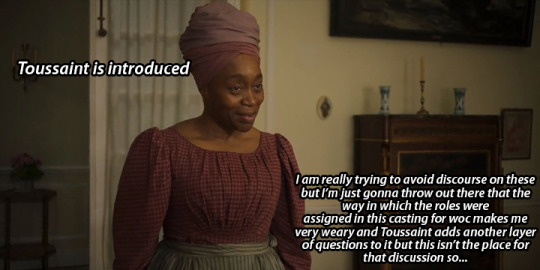
I know this show is casting in a general way as a suspension of disbelief of some historical facts and I’m all for diversity in casting in period dramas, regardless of anything else, if it’s allowing for representation in media.
But, at the same time, you need to be careful with your optics. She could have been cast as anyone else.
I don’t wanna go over this a lot because I don’t know enough about these parts of French history nor is it my story to tell, but the problem is in the erasure of conflicts or racism altogether as a way to prompt a shallow sense of diversity in a story that is directly linked with the subject of oppression.
Let’s continue with another similar optics problem involving “diversity” to exemplify this issue further, so that I can clarify.
This barricade had women on it and didn’t have Combeferre.
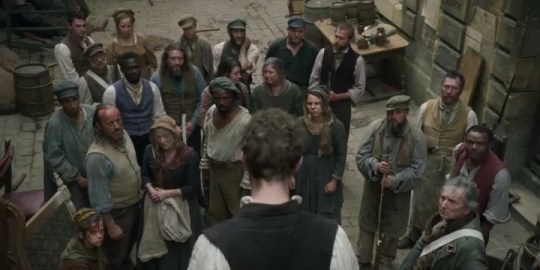
Now, here is the thing about that. In the barricade my man Combeferre gives an amazing speech about women and children.
In case you weren’t aware, the 1800s were the moment when European women and children barely started to be seen as separate members of society and not only “men but worse” and “men but small”. There are a lot of good articles about that, including one by Martyn Lyons about the new readers of the 19th Century, which changed the course of the editorial market, those being women, children and working class men, who didn’t have access to literature or literacy before that. The idea of childhood as we know it started then, and the later editions of the Grimm fairy tales was one of the first published books of fairy tales explicitly aimed at children’s education. And since a lot of us, in other places of the world that aren’t Europe, were colonized af or barely getting free from colonial governments in the 1800s, we kinda had to go with the flow, regardless of the social structure of native peoples, because colonialism sucks.
But you all came here for Les Mis so, let’s get back to that.
As this terrible and summarized dive into history implies, women and children were vulnerable to the fucked up state of social strife. Education was scarce and only accessible to some, employment was scarce and only accessible to some, food was scarce and only accessible to some. Most often than not, “some” did not include women and children.
In comes the the sun to my moon, Combeferre, with his speech.
He talks about all of this. Basically he talks to men who are the main providers of families, providers of women and children who depend on them and goes (I’ll paraphrase) “it’s our fault as a society that women can’t be here now, it’s our fault they don’t have the same possibilities and education we do, so at least do them a solid and don’t die today here if they depend on you to live, because the only possibility they have without your support is prostitution”. It was a fucking power move to include that on Les Mis. I mean, the entire book is a call out to the social and political situation, but damn.
So yes, there aren’t women there but the reason for it is that patriarchy sucks and the consequences would be disastrous for them.
Davies & co. pretty much didn’t give a shit about this. But, at this point, considering Problem #1, who’s surprised.
They removed Combeferre, his speech and placed random women on the barricade, as if nothing of that was going on and the patriarchy didn’t exist. Because ~diversity~.
The fact that they thought more woke to put some random women there on the barricade to die fighting instead of acknowledging the existence of sexism altogether pretty much sums up what this whole show thought diversity was.
For them, diversity wasn’t a political and social standpoint born from reality, a way to represent the dynamics of oppression that are at stake even on this day, but an aesthetic.
And, talking about speeches, let’s move on to the next bit.
Problem #4: Where are the politics?
1. The social and political landscape
Les Mis adaptations have a fluctuating balance with politics and social conflicts.
That is, at the end of the day, the very core of the existence of this story, the reason why still, to this very day, it is relevant and quoted, adapted and regarded is the fact that we still need it.
All of us, as human beings living as members of society, are always immersed in political decisions. It’s not only unavoidable, it’s part of our lives as people living together.
In the same way, the personal narratives of the characters of Les Mis are intrinsically linked to this landscape. They are set in different places of the social spectrum and hold different power dynamics and actions that relate to political standpoints.
Adaptations tend to work this in very different ways.
Some focus less on the politics and more on the social strife, with a greater focus on the characters. Others re-insert the characters in other different historical moments with the same levels of social and political strife. Others just copy-paste the situations and put them in another context, without really explaining what revolution it is, what they’re fighting for and why they’re being killed. The focus varies.
It seems, for how this adaptation starts, with Waterloo and a subsequent argument between Gillenormand and Baron Pontmercy about Napoleon, that politics are going to be important. This doesn’t last very long.
My biggest issue with the introduction of these circumstances is that they don’t bother on them but then attempt to use them for gratuitous self righteousness. It isn’t that they abandon them altogether, they overlook them but then attempt to use them for shock value.
There is a constant use of exaggerated, almost cartoon-y, stagings of social depiction:
- You have Gillenormand dining with his boys, in a luxurious and incredibly flamboyant scenery, while dissing political views in an almost comical fashion
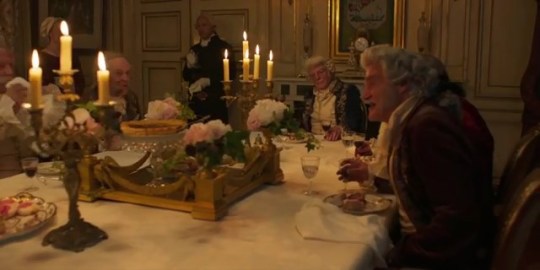
- You have beggars downright assaulting Valjean and Cosette on the street right outside the convent, as a means of shock to Cosette’s expectations of the world outside of it
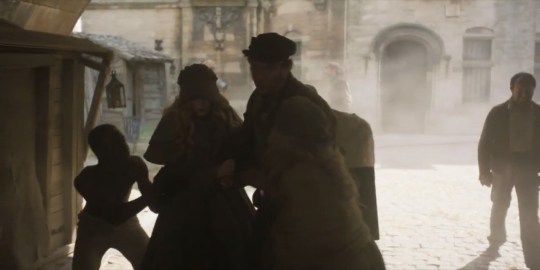
- You have Fantine’s entire sequences as a prostitute with higher and higher degrees of abuse
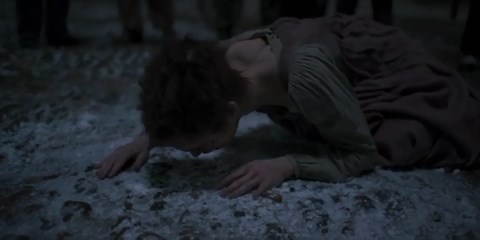
- You have the streets before the barricades, in some sort of confusing clamor that loses focus in favor of Valjean’s storyline
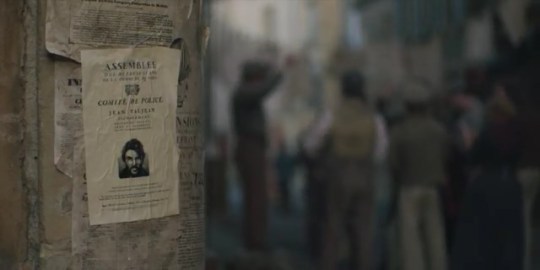
- You have a god awful last scene which attempts to say something socially compromising by showcasing the kids Gavroche was helping (I don’t think they’re siblings in this version), as a means to say “the revolution wasn’t successful and social strife will always continue” I guess, I don’t know, because it’s not like they gave a shit about it all before, so this kind of Perrault-ish moral of the story at the end makes no goddamn sense
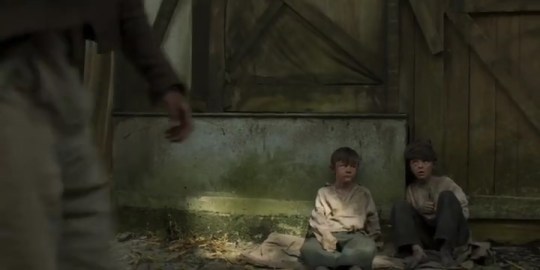
They are exaggerated snippets of things without context, with very little exposition, that are used more as props to shock than they are to actually take a stand on what the original story is trying to tell.
Even the reality Fantine has to suffer is blurred by the fact that the social situation isn’t seen as much as a reality in itself but a combination of Fantine’s “choices” and Valjean’s “guilt”.
But, in order to delve more into the non-political aspect of this adaptation, let’s focus on some specific characters.
2. Enjolras
Well, I’ve seen a lot of Enjolrai in my life (is that be the plural of Enjolras? yes? no? can it be?).
Enjolras has very different characterizations, even within fandom itself, but we can all agree that he’s a) highly political, b) highly committed to the cause and c) extremely charismatic.
And when I say “charismatic” I mean it in the sense that his speeches are so beautifully crafted, so certain and commanding, that you just wanna listen to what he has to say, regardless of your views. They’re political discourse but also very poetic, which is a very interesting literary opposite to Grantaire’s voice, but I digress.
Still, Enjolras doesn’t stand on his own.
He represents a part of a whole, an important part, but a part nonetheless. Les Amis are a very diverse mixture of individuals, and the main triumvirate represents different stances on the same political action that coexist together.
Without others to stand with, Enjolras loses context. Not because he can’t support himself as a character, but because his biggest value is within other people.
This Enjolras is confusing, angry and loses a lot of steam when most of the people who should be around him aren’t really paying attention.
Courfeyrac, although performed really well, doesn’t really get a chance to show his political ideas without Enjolras around, and that makes it seem like he’s being convinced to participate rather than doing it for his own reasons and being one key part of the group.

In the barricade, Enjolras acts as if he doesn’t know what he’s doing half the time, and the other half he doesn’t give a shit about killing soldiers, smiling and laughing while shooting people.

It isn’t just that the scene with Le Cabuc doesn’t exist, Enjolras doesn’t seem to have empathy, which is all given to Grantaire instead.
By taking away Enjolras’s vulnerability, his complexity, they make him seem more shallow overall, and in tow, make his cause lose importance.
And without a clear political standpoint, because his expositions about the situation are very shout-y and unclear, and his speeches are summarized with some actual quotes but without their meaning and true feeling, he seems to be fighting just because, rather than having strong ideals.
Enjolras in the brick is eloquent enough, humane enough, that you understand what he’s doing and why. This Enjolras is a mess that I couldn’t understand at all.
I don’t think people who have never seen, read or heard of Les Mis before will understand Enjolras as a character through this. He’s just a very angry student with weird facial hair (why?) who rants in a cafe while his friends are playing games and making jokes, who is friends with some workers and is the leader because he shouts the loudest but doesn’t seem to know what he’s doing.
And, worst of all, doesn’t seem to care for human life. Which brings me to the next bit...
3. Grantaire
Man, was I excited with this casting choice.
When I heard Turlough was playing Grantaire, I was delighted. And, at the end of the day, his performance was very good, but for a character who wasn’t quite Grantaire at times.
I mean, he wasn’t as off as Enjolras, but he was also so erratically written.
They decided to make Grantaire hesitant rather than a cynic. He didn’t get to express his cynicism or his attachment to his friends (what friends though? only Bossuet had a name other than Courfeyrac and Enjolras) and his involvement with the fight was shown as insecure rather than questioning of ideals.
He is shown conflicted when he decides to fight with them, he doesn’t have any of his long speeches, the Barrière du Maine scene or anything of the sort. He is just...hesitant about death, I guess. About dying and killing people. That’s his conflict.
This has, to me, two big problems attached to it.
First, it’s a simplification of the entirety of Grantaire’s thoughts. It’s taking the cornucopia of drunken philosophy that Grantaire’s voice in the brick represents and replacing it with a single fear, which while very valid doesn’t reflect Grantaire’s true extensive complexities.
Second, it takes away from Enjolras’s humanity. Enjolras is showcased as an indiscriminate machine of shooting soldiers while Grantaire is conflicted about having to do this and, in tow, makes Enjolras’s rejection of him when he leaves and gets drunk like a jerk move of an insensitive asshole.
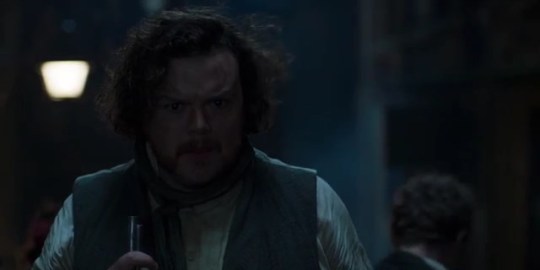
There isn’t a clear instance of Enjolras giving Grantaire a chance to do something before the barricade and Grantaire failing at it, with all the dominoes symbolism and all the stuff it implies. There isn’t a complementary set of complexities between each other. Grantaire seems to care about human life more than Enjolras does in this version, at the end of the day, because Enjolras’s speeches, even if carrying canon quotes, are inserted in a context in which he laughs while shooting people, knowingly sends Gavroche into danger and chastises Grantaire for being conflicted about human lives at stake.
So, instead of representing Grantaire’s true complexity as a character, they chose to give him something else that they think makes him more dimensional, when, in reality, takes away from his (and Enjolras’s) worth as a character.
All of this is very weirdly intersected with drunken jokes. Sometimes, the jokes and the behavior pays off and is inserted in good moments, sometimes they just don’t know when to stop and they kind of ruin their death scene with them, which is even worse considering it’s one of the few where they’re actually holding hands.
Overall, I think this was a simplification of Grantaire, in a way, a simplification which falls apart without a solid context to exist in. And it’s a pity, because Turlough was good.
4. Gavroche
The only reason I’d want an immediate new adaptation of Les Mis is so we can cast this same Gavroche in a decent one. He’s one of the best Gavroches I’ve ever seen, hands down.
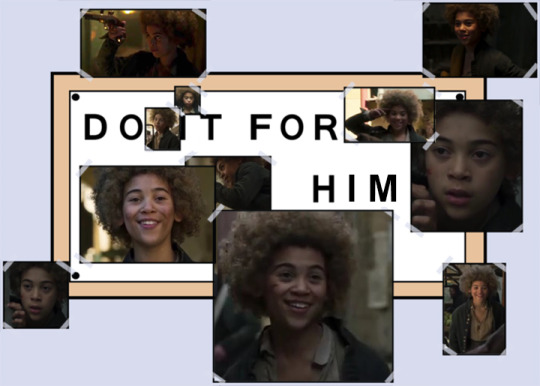
In this case, the problem isn’t with his interpretation or how he was written, necessarily, and all time frame and socio-political simplifications aside, the problem is in how the context reacts to him.
A lot of Gavroche’s agency is deleted in this version.
For starters, his age is kind of all over the place at the beginning. He’s fine by the time of the barricade, but before it’s kind of a mess. As a result, he lives with his parents for a bit longer than necessary and the few times we see him on his own, being his independent self, are in conflict with how his involvement in the main events come to happen.
It feels as if he’s been used in the barricade. When he’s off to find bullets, only Marius tries to get him back to safety, while the rest cheer him and laugh.
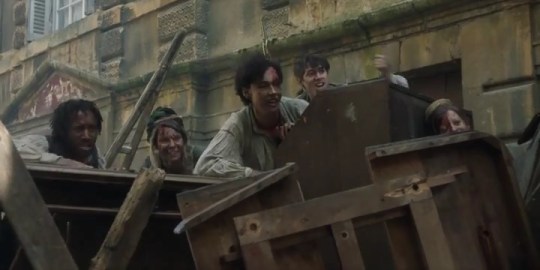
His character is well performed and we get to see his personality and his situation when he’s allowed to act on his own, but within the context he’s inserted in, he seems more like a prop than a character.
This makes it so that when he dies, you’re upset more so than sad. It doesn’t feel like a tragic circumstance born out of a lot of layers of social strife which culminate in a dead end for a kid who deserved a better life. It feels like every adult around him, every person he encounters, either neglects him, mistreats him or sends him into danger. It feels, much like with Fantine, like an easily avoidable situation.
And things get worse with this guy:
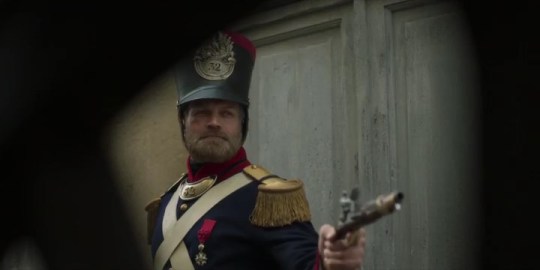
Like I said in my summary, this David Harbour-ish soldier is the one who is shown to mercilessly kill both Gavroche and execute Enjolras and Grantaire.

This is another layer in the modus operandi of an adaptation who uses social oppression and political strife as shock value rather than commentary and discourse.
By personalizing “evil” in one stern, mean, unreasonable, power-hungry soldier, they’re villanizing (and trivializing) the social context as a whole. It isn’t about how Gavroche got to that point, how we as a society failed so hard that he has to die in that way. It’s just one bad guy.
But then, they try to be fake deep about it, by doing that last scene with his brothers or by placing him alongside Mabeuf and Éponine but not explaining what that means, why those juxtapositions are socially relevant and important to the plot (maybe they don’t know why).


Overall, this was such a waste of a great Gavroche that I just feel really bad. Reece deserved so much better.
5. The barricade
Needless to say, this barricade was more of a mess than you would have expected.
The lack of proper introduction to the political landscape, the clumsy exposition, the out of context shout-y speeches and the erratic behavior of its characters, paired together with the fact that it ends about 1/4 into the last episode, giving more time to personal drama than any of what happens in it, makes it one confusing mess.
It’s also in the barricade where it’s super clear how visually similar this series is to the 2012 movie. A lot of visual choices are extremely similar, even when they didn’t need to be (Fantine’s and Cosette’s hair choices? the shots in the hulks? the scaled down yet very similar camera angles and movements during the entire fight? the color schemes of some particular scenes?), and it’s pretty heightened in this barricade.
Which I wouldn’t care about hadn’t they talked crap about the movie during their entire PR campaign.
Like I said, there were so many issues within the people involved in the barricade. With the women, with the characters, with the soldiers. There was also a very strangely set line between workers and students that they were very clumsy about setting yet didn’t get to do much aside from having the leader of the working class men leave when Enjolras prompted it.
By the way, Enjolras was a lot less convinced about the whole ordeal in this version, which made his characterization even more confusing.
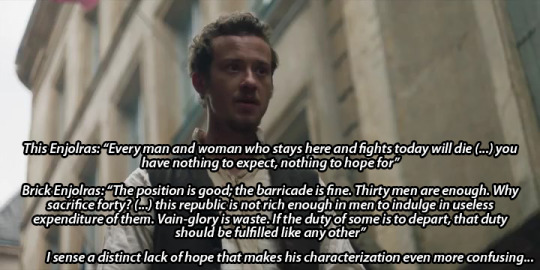
The barricade had a lot of messed up ingredients and not enough time to even simmer. At least the musical, which doesn’t have a lot of time dedicated to the students either, has Drink With Me, which doesn’t only serve as a way to characterize different students and their beliefs and personalities (“Is your life just one more lie?”) but also brings some melancholic change of pace, a pause between the action.
The highlight of this barricade, though, is Marius going apeshit with the torch.

But, all in all, there’s no much we can expect from a barricade born of confused ideas and even more confusing characterizations. This barricade feels less like a climax and more like a thing they had to do because it was in the book.
And don’t even make me talk about how they butchered my favorite speech. I’d rather not have it there at all, tbh.
Conclusion: A writer’s ego
We arrive to the end of this long and boring trip through my thoughts. If you’re reached this point, thank you for your time.
All in all, I feel like a lot of the issues of this adaptation stem from the fact that Davies thinks he’s better than everyone else and other men around him agree so much that they let him do as he pleases, without questioning anything.
I can’t really understand how you’re going through the script of this and see some of these choices (like the dress shop scene, the carriage scene and let’s not even mention the peeing in the park scene) and you go, and I’m quoting Shankland here:
“Andrew’s scripts made these characters feel modern. That was nothing to do with having them speak in a very modern way or changing their behaviour, he just found the humanity and earthiness of it,” Shankland says, recalling a scene in which Fantine and her companions urinate in a Paris park. “I thought, ‘Oh god, they’re going to pee in Les Misérables, that’s exciting.’” Source
That just sums it all up, doesn’t it?
After I watched this, I let some time pass. I watched all 3 fanmade adaptations that are currently out at this moment (back to back), revisited some of the ones I had seen before, read fics, read people’s articles and rants, looked into other adaptations on stage, from the classic ones to the more interpretative versions, and other current tv adaptations being done in other countries.
All of those things are vastly different. Some are more similar to each other, some are widely different, but they’re all different points of view on the same canon.
This is a canon that has some of the wildest possible interpretations coexisting. You can have a play centered on one specific character told through the songs of a specific album, a tv drama in modern times with a lawyer Valjean, a coffee shop au starring Les Amis, a parody comedy set in 1832, all happening at the same exact time.
And that’s great. That’s fascinating. That means this book is still alive because we need it still today.
Some days you’re in the mood for a heavily political adaptation which gives you goosebumps for setting canon in a context that is closer to your everyday reality, other days you just want all the Amis to live and have movie marathons cuddled together. It’s all valid.
But what all of those adaptations have in common is that they aren’t trying to be more than they are. They aren’t acting brand new, they aren’t pretending they’re re-inventing the wheel or that they are smarter than Victor Hugo himself because what Hugo didn’t know he needed in the “psychology of the book” was a soulmate au or a documentary series.
This adaptation, through what they said and how it was written, acted as if it was going to be the ultimate Les Mis adaptation to end them all. It presented itself as smarter than us all, as holding the keys to the meaning of Victor Hugo’s thoughts, as being able to fix his “mistakes”, fix other adaptation’s “mistakes” and deliver the best interpretation of canon possible.
And it managed to be a sexist, socially insensitive, problematic, un-political, homophobic mess.
Which, is a problem in itself, but even more so when the canon you’re adapting should be, first and foremost, against all that. It isn’t about how many brick quotes you use, it’s about channeling the soul of the story.
#les mis#les miserables#les mis bbc#les mis bbc a summary#jean valjean#cosette#fantine#eponine#marius pontmercy#enjolras#grantaire#gavroche#death cw#long post when expanded#luly rambles#bbc les mis
50 notes
·
View notes
Photo

OC Questionnaire - Estryon Thramian
Found this in my drafts, and decided to finish off what I had to distract from the tediousness of trying to decide what to do with the aspect of his backstory mentioned earlier. I filled this out according to how he was at the very start/before the events of Skyrim, unless stated to be what happens later on.
Feel free to use this for your own OCs, I don’t mind.
TW; Mentions of pregnancy (of a trans man). Also, some NSFW implications.
GENERAL
Name: Estryon Thramian
Alias(es): Estre is a little nickname Ondolemar took to using later on. Arelnian, the parent who carried him and the only one he met (they died when he was two, his father died prior to his birth), also called him this. It is also his birth-name. Perhaps a bit of projection on my part. I don’t mind my birth-name. (altho it could just be because if i do mind it, i’m in for bad time from it)
Gender: Male.
Age: 25 years old.
Place of birth: Sunhold, Summerset Isle. Or rather, Alinor. Morning Star 19th, 4E 176 (The Ritual)
Spoken languages: Tamrielic and Altmeri. Unsure exactly how native languages vs the common tongue works in TES, but I’ll just assume/HC it’s either like Latin (commonly taught but not used in every-day conversation) or just very secondary compared to Tamrielic. So that’s the status on his knowledge of Altmeri. Also had a minor interest in Ayleidoon when he was younger, so he knows some basic vocab, but not too much. Like you know how some people go through HS and take the entirety of Spanish/German/Whichever for the full four years and as soon as they graduated they forgot all of it? That’s Estryon with Ayleidoon.
Sexual orientation: Gay.
Occupation: Thalmor agent. Mainly used in assassinations and to stoke the conflict in the Skyrim Civil War by framing (in murder, accusations of law-breaking, etc.), propaganda, etc. Prior to that, as I’ve recently elaborated, he was a member of a elite force in Summerset called the Accipiters. They’re, as said, are similar to the First AD’s Eyes of the Queen, except with more brutality and tendency to murder. They are charged with cutting down all heresy and resistance against the Thalmor in the Isles through more silent and undercover tactics. Through whatever course of events I settle with, he is suspended and demoted within the Accipiters and sent to Skyrim to work as, again, a basic Thalmor agent for the time being. It’s not like he’s put into a useless job. Thalmor forces in Skyrim, according to this , are rather stretched thin, and with someone as combat skilled as Estryon, his work is much, much needed. Doesn’t mean he likes it, though. He hates it.
APPEARANCE
Eye color: Vibrant yellow/amber.
Hair color: Pale cream/blonde color.
Height: 6′ to 6′3/4. Haven’t decided.
Scars: Slight slashes/cuts on his right cheek and a scar on his right bicep. Likes to use… risky methods in his assassinations because he’s a dumbass and that has given him a few severely close calls on fatal weak spots; there’s a medium-length scar across his left abdomen, a shallow, light scar on his collarbone (was an attempt at his heart), and a few small ones on his thighs.
Burns: No major ones, but a lot of little burn marks because 1.) He sucks at cooking and 2.) Little mishaps in destruction magic usage.
Overweight: No.
Underweight: No.
FAVOURITE
Color: Yellow.
Hair color: He likes lighter hair colors but it’s not a huge factor.
Eye color: Yellow, but as said, not too much of a preference.
Entertainment: Horse-back riding. Causing general issues and difficulty for those around him. Taking care of horses. This man really likes horses. He also has a fondness for burning different stuff he finds, some of that stuff being important shit to someone other than him. There’s one major entertainment he commits to a lot but I’ll leave that unmentioned for modesty’s sake.
Pastime: This dude really does not do a lot to entertain himself other than [censored]. He spends a lot of time meandering and wandering and just.. being there. Either that or he rapidly switches between different pastimes because he can’t stay with one for the life of him. (he gets bored very, very easily) But. If anything, as said, he likes to experiment with magic and alchemy, and he loves horseback-riding and taking pleasure rides. This easy tendency towards boredom leads to recklessness and an unhealthy lust for thrill and adventure.
Food: As typical of Sunhold natives, he gravitates towards sea-food and he likes crab. Not typical mudcrabs from just anywhere, however. As is common knowledge, there are a lot of different varieties of Mudcrabs and there’s one particular off the coast of Sunhold that is high-demand and very flavorful. But other than that, he has a guilty sweet tooth in general, and he B U S T S A N U T for vanilla ice cream.
Drink: He’s boring. He just likes water. He enjoys some lighter alcohol, though, and perhaps some tea, but again. Water.
Books: Enjoys magic studies and books. Doesn’t like a lot of heavy-information stuff other than that, though, but he does like a bunch of light interests like aromatics and alchemy. He has Arelnian and their large array of aromatic/alchemy books + store to thank for those two interests.
HAVE THEY
Passed university: Yes.
Had sex: Pft. Yeah.
Had sex in public: Depends. Like, straight up banging in like, a marketplace? Nah.
Gotten pregnant: No. Not during the events of Skyrim, at least. Not until much later.
Kissed a man: Yes.
Kissed a woman: Yes, once or twice.
Gotten tattoos: Yes. Little ones. He has an eagle wing on each side of each of his ankles, and the Dominion emblem on the back of his neck. All hurt like Hell (especially the Dominion emblem one) and he’s kind of halted off of getting any after that.
Gotten piercings: Ear piercings, yeah. He typically likes small gold hoops or little jewels, but he tends to go through long periods of time where he doesn’t have any in.
Been in love: Yes.
Had a broken heart: Oof. Yeah.
Stayed up for more than 24 hours: Yes. He oftentimes has trouble sleeping. Has been that way since he was little, according to Ohtehil, at least.
ARE THEY
A virgin: Pft. No.
A cuddler: Not really, but, I mean. He’s not beyond it. He’s just not a very personal person in general.
A kisser: Yes.
A smoker: Not frequently, no.
Scared easily: Not typically, and even if he is, he takes care to not show it. He might flinch and recoil and you can get a little bit of a gasp from him but other than that, no. Unless it’s something incredibly outlandish or unnatural or… terrifying. Like a dragon. A large, ebony black dragon with red eyes flying from the mountains and passing over you, rumbling the ground and triggering all your fight or flight instincts. Yeah. Kinda scary. (but even then all he did was dive out of sight and hide underneath a little rock overhang. he may have taken a bit of a tumble in the process but i’ll have you know his cold altmeri exterior ™ was still in-tact)
Jealous easily: Gods, yes. He wouldn’t let that be known, however.
Trustworthy: Absolutely Not
Dominant: In terms of personality, yeah. He hates being told what to do, he thrives on spiting others, and while he is quite reserved and quiet he still manages to be…. over-bearing and dominant. He has three very particular methods of getting what he wants and one of them is a glare that could kill and keeping all words to the minimum, while also having those words cut sharp. Does that make sense? He’s one of those people that just have an overpowering presence without the need to speak. That’s one reason he doesn’t have a lot of friends, really. Anyways. One other method is straight-up killing whoever he wishes to and the other… Well. If you’re talking dominance in bed, he adapts to what is needed, wanted, or what he’s in the mood for. Whatever leaves his target vulnerable to a swift kill, framing, or easy investigation of possible heresy/conspiracy. So yes, actually, I guess he is dominant. Quite so.
Submissive: In any other context other than the Spicee (tm) one, no, not really. If in that context, then, only if he wishes to be.
Single: Yes, no committal relationship until later. Although, there was one earlier, but I haven’t developed it completely. I’ll give a little peek. It was with Thalmor Agent Sanyon. That dead Thalmor, at a Talos shrine? Yeah. High-school sweethearts, if you will. Estryon finding Sanyon’s body at the shrine, or rather, going there at all ultimately sets the course of the events of the main questline. That little event, along with Ohtehil’s little ‘turn-into-a-werewolf-and-slaughter-all-your-colleagues’ theatrical go hand-in-hand in starting it all. Estryon finding Sanyon dead would not have happened at all if not for Ohtehil, actually.
RANDOM QUESTIONS
Have they harmed themselves: Minor things.
Thought of suicide: Yes.
Attempted suicide: No.
Wanted to kill someone: Yes.
Actually killed someone: Yes.
Ridden a horse: Yes. He’s quite the horseman.
Have/had a job: Yes.
Have any fears: He isn’t too fond of heights. Or blood.
FAMILY
Sibling(s): Ohtehil (22 years older) and Tretlas (55 years older).
Parents: Arelnian and Ciryarel Thramian. Both fought in the Great War/First War of the Empire on the Dominion’s side. Ciryarel was a skilled mage who worked rather high up in the Dominion and Arelnian was also well-respected as an informant and recruiter stationed primarily in Hammerfell. Ciryarel perished in the final battle and Arelnian received significant injury. Survived two years post-War, but a highly weakened immune system as a result of the injuries ultimately cost them their life.
Children: No. Later, however, he does adopt Lucia and Sofie and does have Diatres, his only biological child.
Pets: Cyrel, a smokey black and sleek Summerset-bred mare. Had her imported upon the discovery he would be suspended in Skyrim for longer than anticipated. Prior to that, she was being boarded for a rather expensive price over at the Sunhold stables. And then Umaril, a “Pocket” Salamander. Ohtehil got it for him for his 9th birthday not anticipating a long lifespan nor the HUGE size they grow to be. Once it started growing alarmingly fast and large Ohtehil figured as long as Estryon was enjoying himself it would be fine; once he grew older he could get rid of it if he tired of taking care of such a massive and intelligent creature. Estryon did not get rid of it. Quite the opposite. He’s the dude to have a suspiciously large bag being lugged around and you see him stop once he’s in the clear, unzip it, and suddenly his dog or in this case a very large monitor pokes his head out. His commitment to Umaril and Cyrel is incredible compared to his dedication towards actual people.
7 notes
·
View notes
Text
SasuNaru and the pin hole
(semi anti ending but not tagged as such as its mainly pro, so beware..vv semi tho)
@sasuke-prevails
Okay, so I’d reblog your post with a reply but my computer always freezes up when I do that and try to add pictures and I can barely use the tumblr app as it is so gaaaah. Plus, I’ve always wanted to make this post debunking everything SNS claim anyways. So here you go. sorry about the wait, i was so lazy..sorry about some shakey images i have GAD
First off, I’d like to say that when I say I am a Naruto fan, I don’t mean the character. I mean, don’t get me wrong I love Naruto too, but I am referring to the series. I genuinely love this series despite all of it’s inconsistencies, I am late on the band wagon but I prefer that since it allows me to think objectively. SNS tends to view the series with what I like to call pin hole vision where the entire series is naruto x sasuke, they are the center bond because they represent everything the series itself stands for. They are not together all the time, they haven’t had the healthiest relationship but they’re the centre bond because as proven by the first and final battles in the VOE, both at the end of part 1 and part 2 respectively it’s a ‘it boils down to this’ type of thing. However, when I say I am anti romantic SNS it does not mean I am anti their friendship. Do I think its unhealthy? Some aspects of it, yes. Problematic, yes tbh.
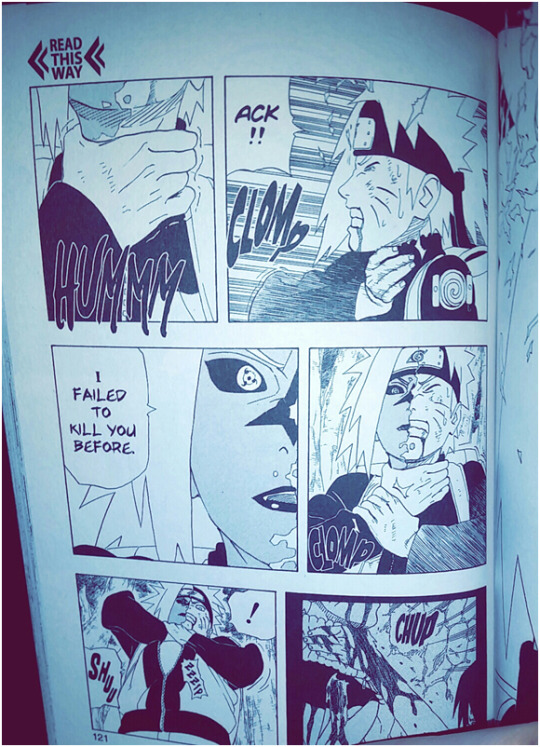
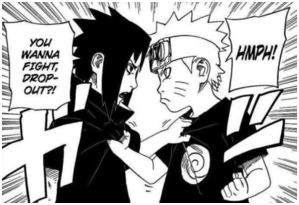
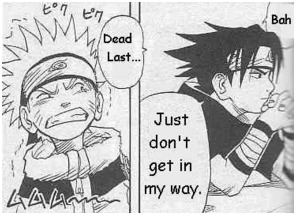
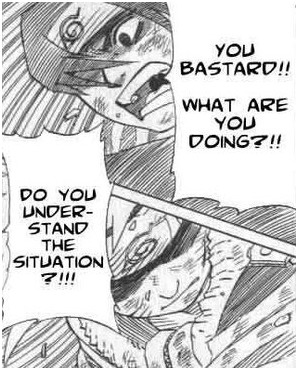
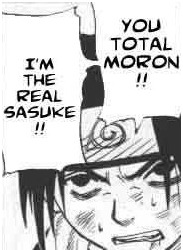
These are good examples I think. Narutos worst fears early shippuuden were disappointing his comrades, and this. Why is is problematic on Narutos side? I’ll cross that bridge when I get to it
I’d like to mention what naruto as a series stands for, and always consistently stood for.
‘Nande?’
‘Onagi dakara’
‘why?’
‘because we are the same.’
-Narutos first bond, Iruka
‘Konoha o mamoroto tsuyui ishi’
‘strong will to protect the hidden leaf village.’
-Hiruzen
‘sato wa nanda?’
‘what is a village?’
-sasuke, ill get to it
‘Kono hi no ishi mote oru kagiri kono sato no mono wa subete kazoku sono mono nanja’
‘as long as one has this will of fire everyone in this village is family.’
‘Iruka sensei? Nande hito wa hito no tameni inochi o kake- ah fuck this translation takes too long im sorry omg
‘Iruka sensei why do people risk their lives for other people?’
‘When one person dies, their past , their present and their future disappears along with them----those people who die have dreams and ambitions, but everyone else has something just as important. Parents, siblings, friends, lovers..those who are dear to them. They trust each other and help each other—that string gets which connects those people gets stronger and thicker by time. It’s impossible to explain why, those who hold those strings just do it, because it’s important to them.’
‘yeah. Somehow it’s clear even to me.’
-Iruka and Naruto when Hiruzen died protecting the village
‘When someone has something they want to protect, their true power comes along’
-Haku
It’s because we help out when they’re in trouble that we can count on them to come running when we need it.
-Shikamaru, about Suna
‘If comrades that you trust gather around you, hope can take physical form and become visible. That`s what I believe...’
-kakashi, to obito
I won't allow my comrades to die. I'll protect you with my life. Trust me.
-kakashi
The next generation will always surpass the previous one. It's one of the never-ending cycles in life.
-kakashi
If you don't share someone's pain. You can never understand them.
-Pain
‘A long cycle of hatred humans have come to call history’
Just by living, people hurt others without even realizing it. So long as humanity exists, hate will also exist. There is no peace in this cursed world. War is just a crime paid for by the pain of the defeated...
-pain
Now there's something I understand a little better. Hate, sadness, even joy. To be able to share it with another person... Naruto Uzumaki. From fighting him I learned that. He knew pain like I did and then he taught me that you can change your path. I wish that one day I can be needed by someone. Not as a frightening weapon... But as the sand's Kazekage.
-Gara
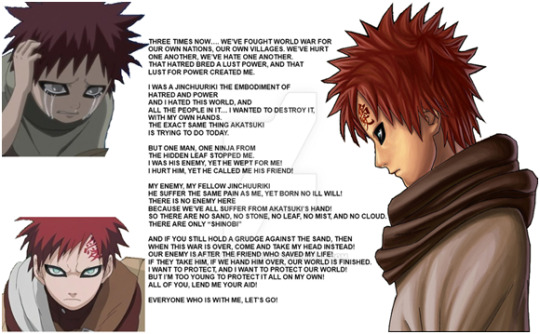
People's lives don't end when they die. It ends when they lose faith.
-itachi
‘ill never let my comrades die, those words and the conviction behind them are not lies, because neji was able to store those words in his heart. Brother Neji died! It’s not just you Naruto, we all hold those words and feelings in our heart.That is what binds our lives together and makes us comrades. If we all give up those thoughts and feelings Nejis final act would have been for nothing. And that is when your comrades truly die.’
-Hinata
The pain of being alone is completely out of this world, isn't it? I don't know why, but I understand your feelings so much, it actually hurts.
-Naruto
That void is something that everyone helps you fill. Just because you face adversity and hardships, is no reason to give up on this world. A person willing to throw away all those memories... of their friends and comrades, will never find peace of mind. Resorting to something like that isn't going to bury that hole. If you persevere and endure, someone will be there to support you!
-Kakashi, to obito
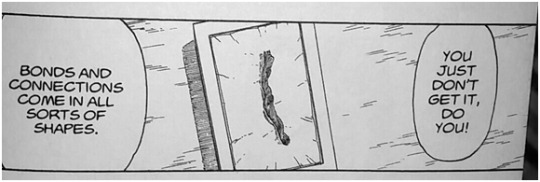
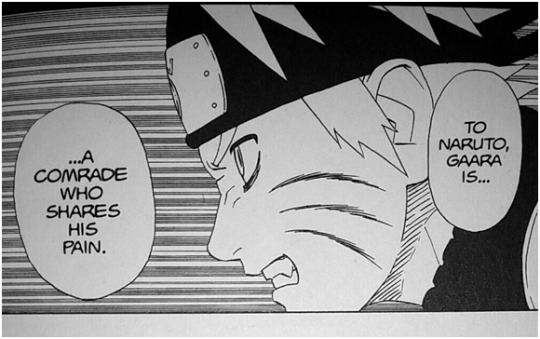
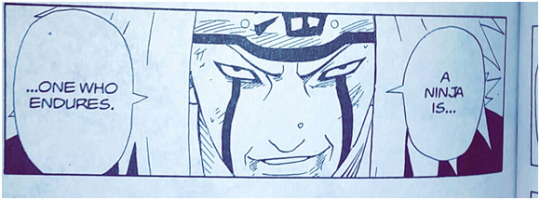
I love sasuke. I love all of his bonds, and despite the shit he dealt with in the series he really does represent the message of the series really well…an atypical antagonist, an incredibly well written character who fills not only his shoes in the story, but the shoes of many other characters.
You say Sasuke offered his food to Naruto because he cares about him and I agree, empathy stems from care. But going by your argument.
Despite this
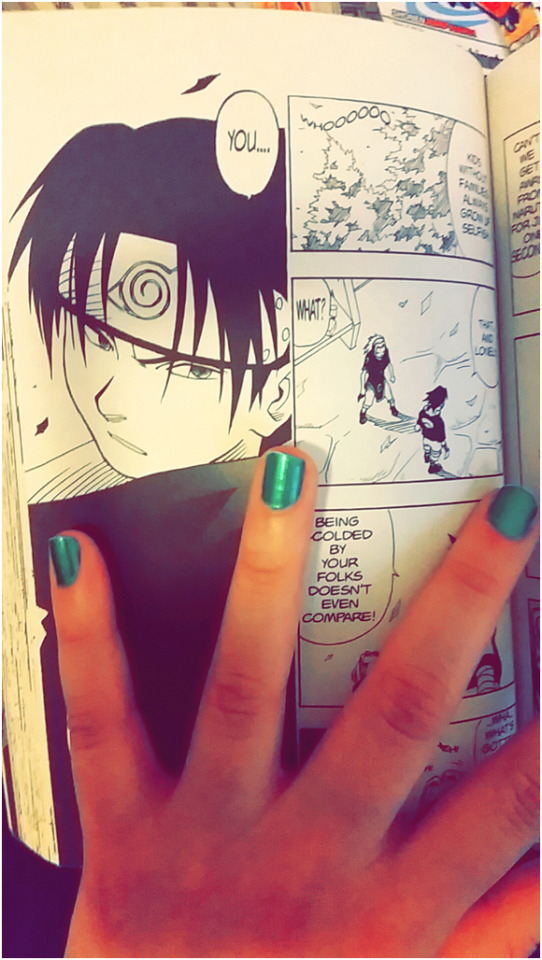
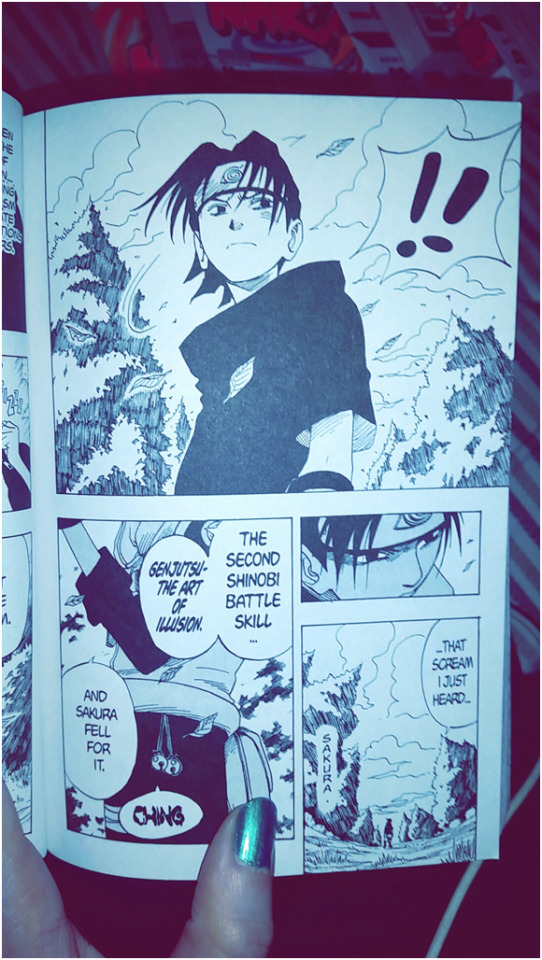
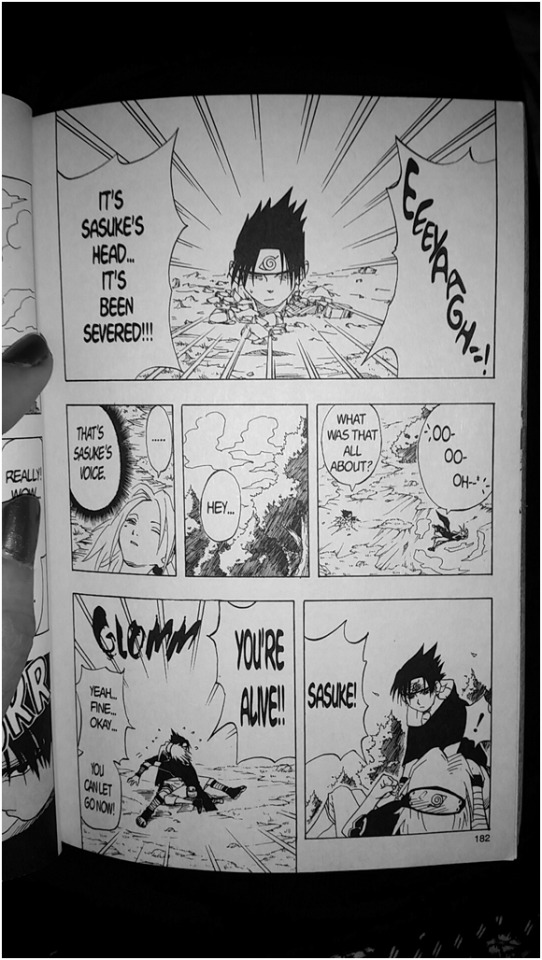
He did wait for her to wake up, also risking elimination and a halting of his revenge plans.
It’s important noting that before any of this, their goals were very self centered and none of them were playing by teamwork..except sasuke, who boasted that he was better than them to Kakashi, but was still the only one who linked them together, by feeding naruto and by saying the whole ‘we are a 3 man cell aren’t we?’
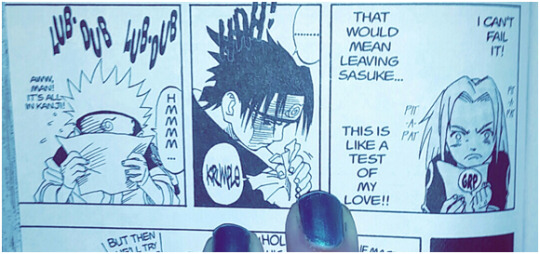
That’s another thing I love about this guy, he really brings people together despite the fact that does not talk for 98% of the series. Taka developed because of him and so did 7.
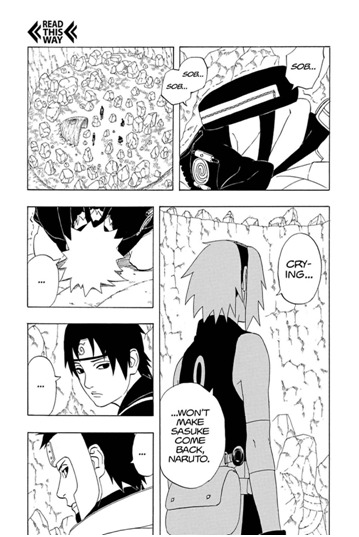
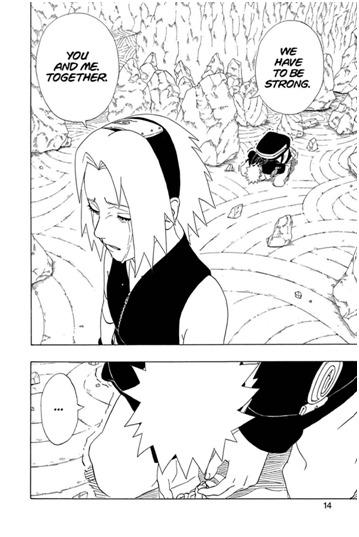
A constantly relevant theme.
the first mission bought light to what their relationships would be like very early on, and also imprints these guys as personal bonds based on friendship and affection that sasuke shares, a feat that no one else in the series was able to do aside from his family.
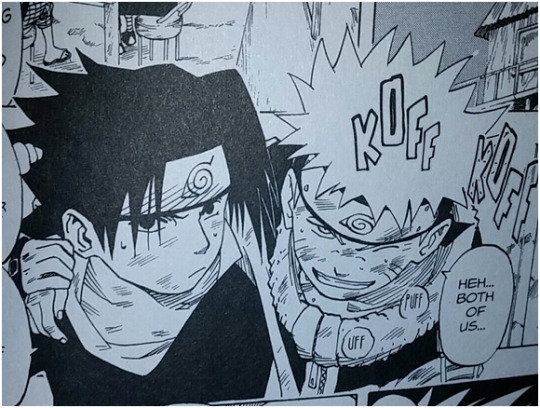
From the tree climbing exercise that combined their rivalry and their friendship to this moment that made a grown ass man cry
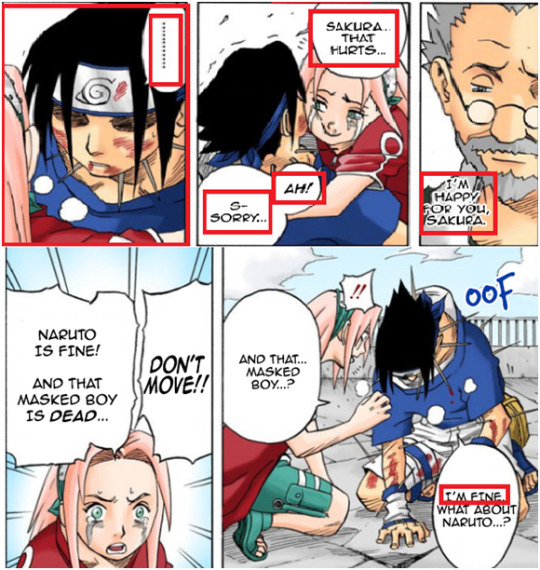
ENCOUNTER WITH FRIENDS WHO CAN EASE HIM FROM LONELINESS!!
【仲間】 「それまで恋や友情に見向きもしなかったサスケは、ナルトやサクラと出会い、少しずつではあるが、仲間を受 け 入れ始める。サスケにとってナルトは、いつの間にか互いの能力を高め合う良きライバルとなり、 また大蛇丸の 邪悪な呪印にのみ込まれんとするその心を、サクラに救われたことも... 」
↳ 【COMPANIONS】 Though until then he had taken no notice of either love or friendship, after meeting with Naruto and Sakura Sasuke begins to accept them as nakama, even if only little by little. In Sasuke’s eyes, before he even noticed it, he and Naruto became mutual good rivals capable of boosting up each other’s skills - and also, when his heart was about to be swallowed by Orochimaru’s wicked cursed seal again, he was rescued by Sakura…
‘as they go on countless missions together, he sees her strengths and weaknesses and views her as someone he needs to protect’
「呪印の影響で暴走するサスケを身を挺して鎮めるサクラ。サクラのサスケを想う心が、邪な力を 包 み込む。」
↳ Sakura willingly and bravely calms the rampaging Sasuke under the influence of the cursed seal. Sakura’s heart, thinking of Sasuke, devours the wicked power.
For Naruto who was considered a failure, Sasuke was more than an annoying guy who got the best grades: he was also the rival that won Sakura’s heart, for whom Naruto is in love …! That’s why he always gets annoyed with Sasuke
Sasuke, who only had power for revenge, becomes stronger because of his companions. His true place would have been a future among them.
Growing distant, towards darkness. The one to appear before him as he began leave was Sakura. To the back of a Sasuke that tried to avert from what was being left behind, Sakura desperately conveys her feelings. Bright and earnest feelings - feelings that did not want to lose Sasuke. The one who filled his lonely existence with the emotion called love was Sakura. But, as expected, Sasuke cannot respond to those feelings. Sasuke was only able to leave a single word of thanks as word of parting.
Friendship and love, a future filled with warmth. But as long as he is there, he cannot make his dream come true. This is why he throws away a future with his friends. To make dreams of revenge a reality…
As is confirmed by the databook.
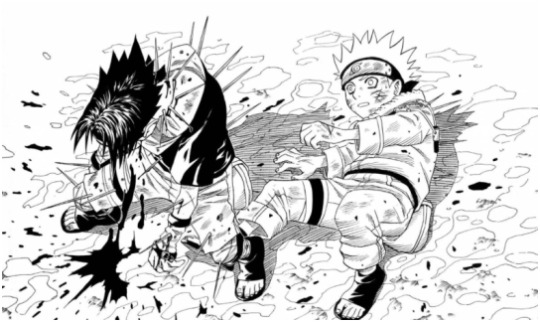
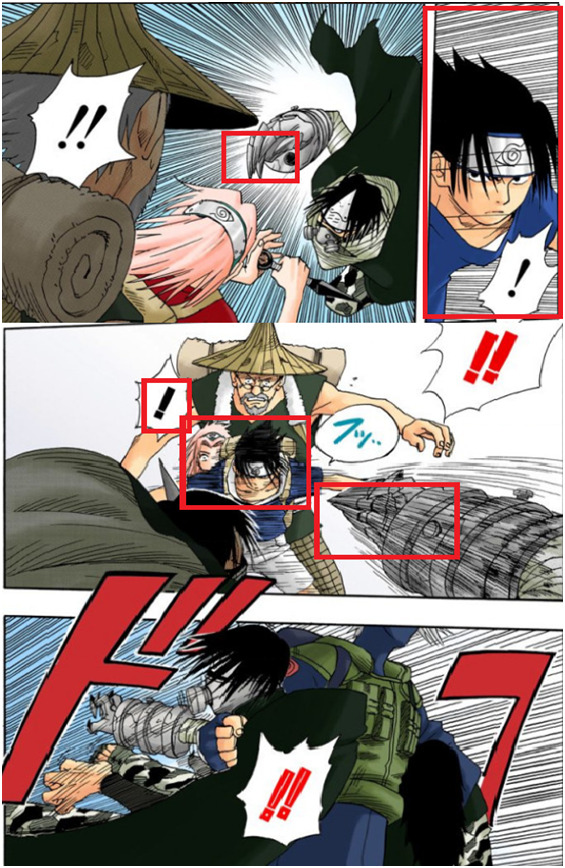
Sasuke risked his life for them both, and he would have done it again no thinking what so ever, partly because he is a selfless person and also because they already imprinted on his mind. Sasukes relationship with Naruto is given a rivalry mixed with friendship context early on and my friend who had 0 to do with naruto burrowed volume one from me and in school while she was reading asked me if sasuke and sakura end up together, because authorial context is clear
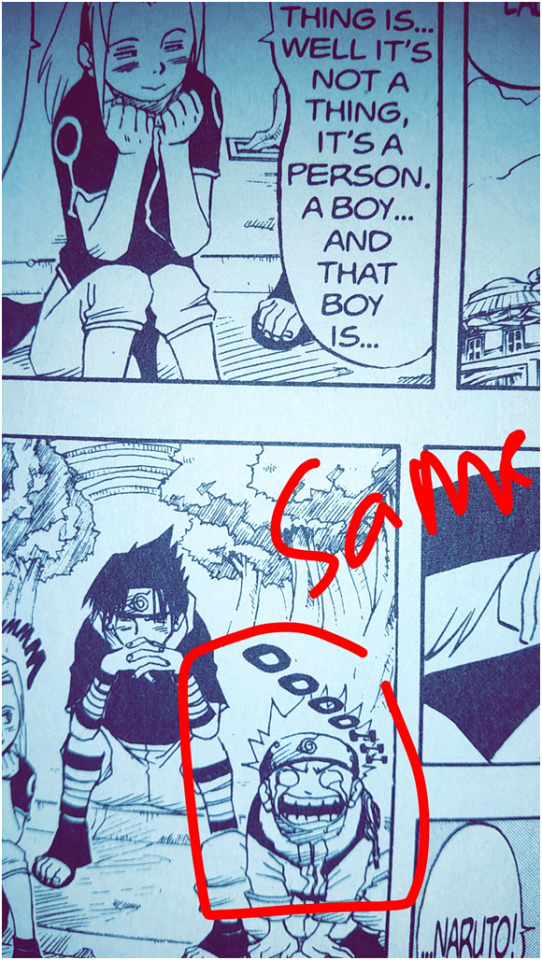
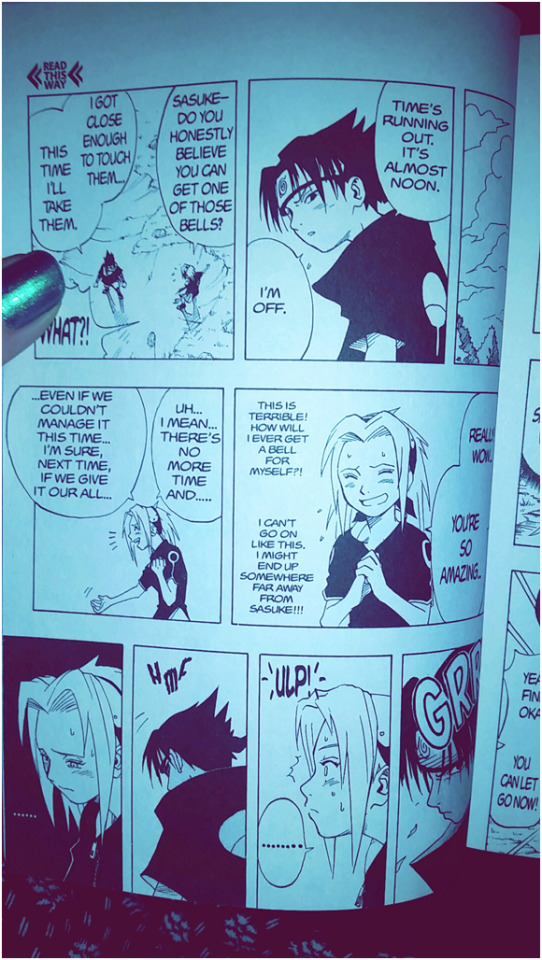
In fact this scene builds up a very good argument I have for this ship that I will get to, where we first learn of his entire stance in the story and sakura is like? Mind you, this was at a time before sasuke ever spoke about these things to anyone…he made me cry is not something he ever told anyone other than sakura. She was intuitive to he him, even during the war when she had a feeling he’d start shit up early on.
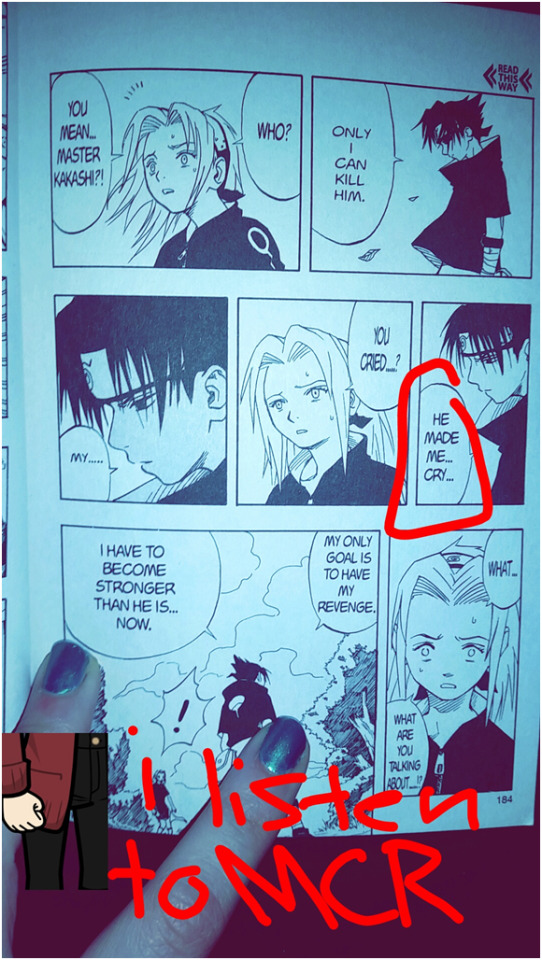
You could argue he is blushing bc he is embarrassed… but he has had girls thirsting after him since he was fresh out the womb. ‘he came off stand offish’ well, yes naturally when a person is suffering from trauma and survivors guilt they tend to isolate themselves and become reclusive and irritable. Now, add the fact that the trauma happened at such a young age and you have a sasuke. But he still, took out the time to say he’s emo (a joke ofc)
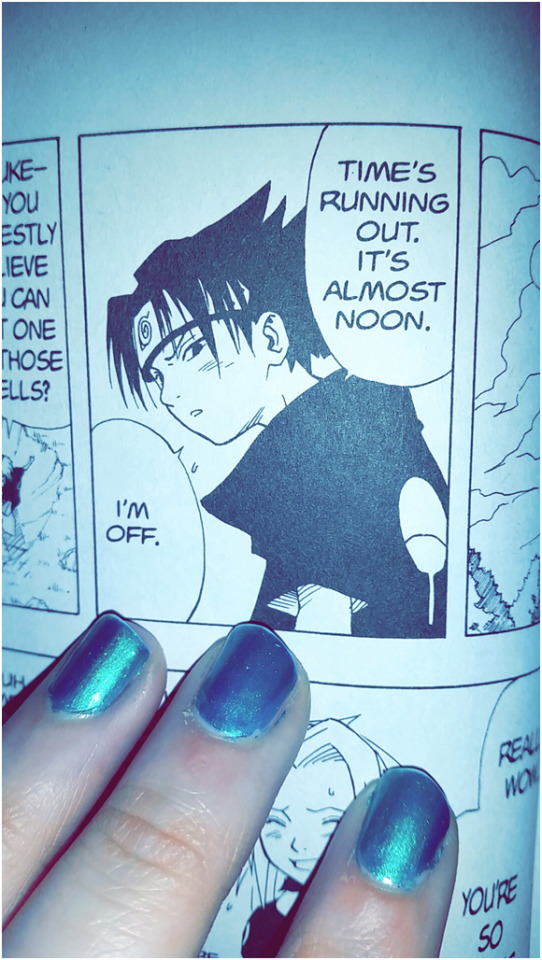
The only ‘romantic context’ ever given to Naruto and Sasuke was the ‘accidental kiss’ which ended up like this
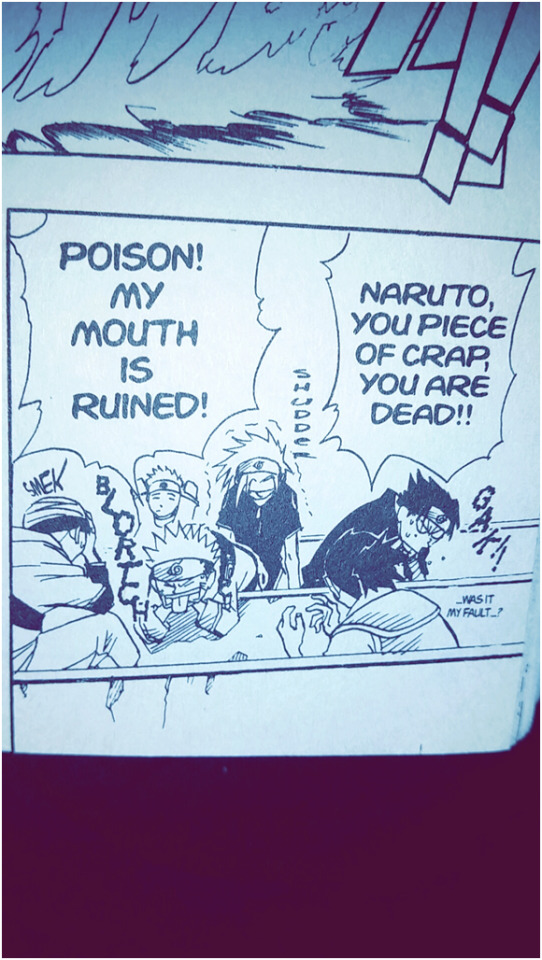
Over the course of the series we see Sasukes attachment to team 7, in the same context given before. Best friend and rival, girl he feels protective affection for.
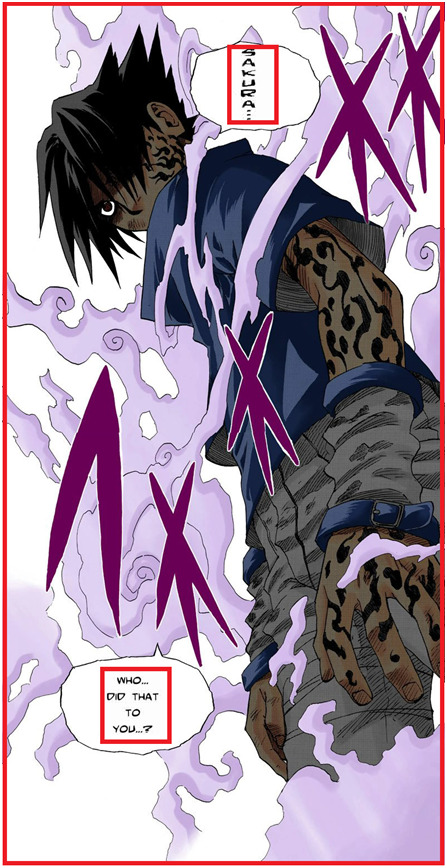
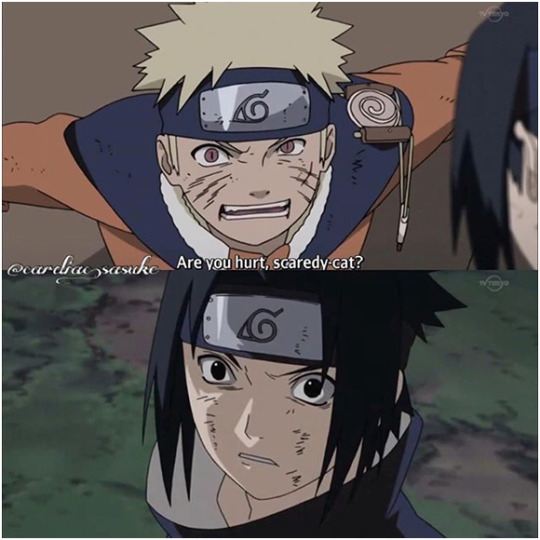
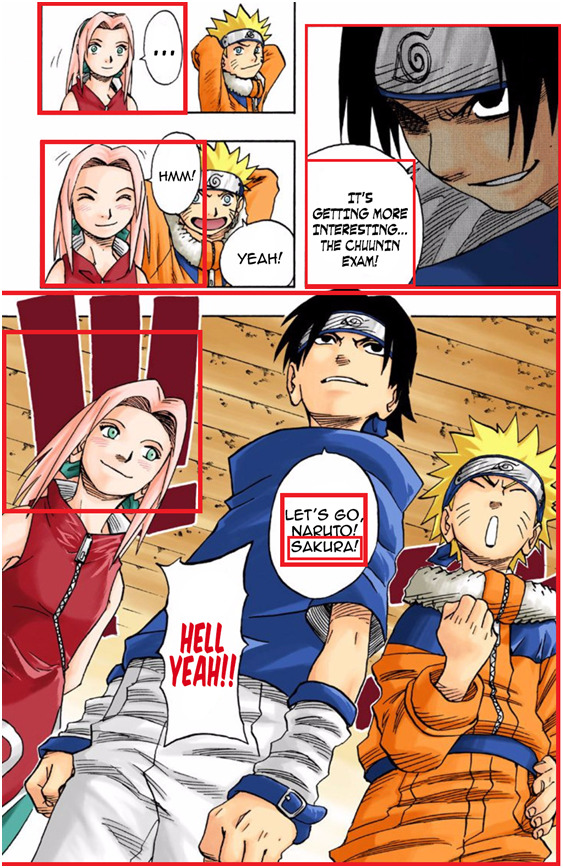
however, the context between sasusaku was always romanticized
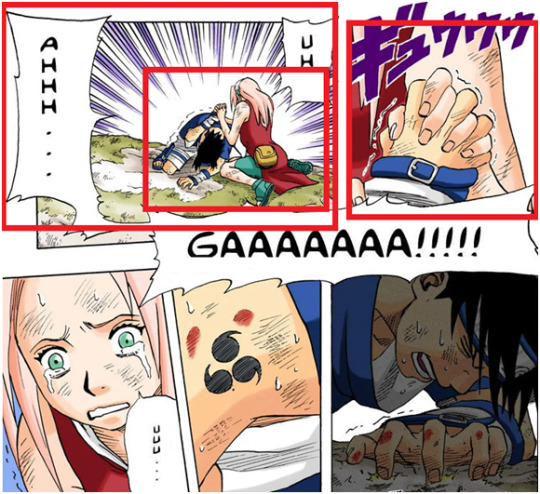
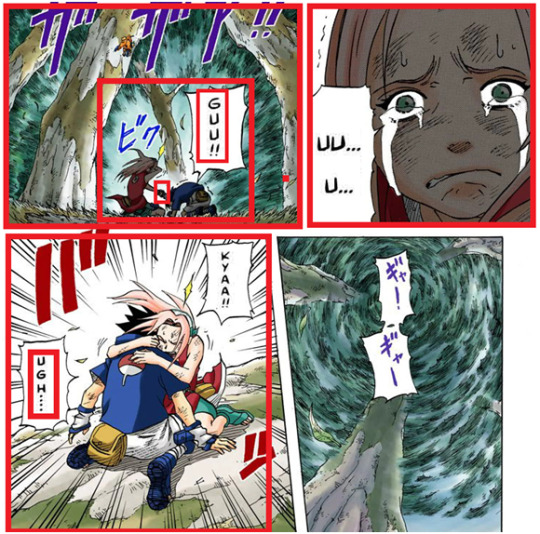
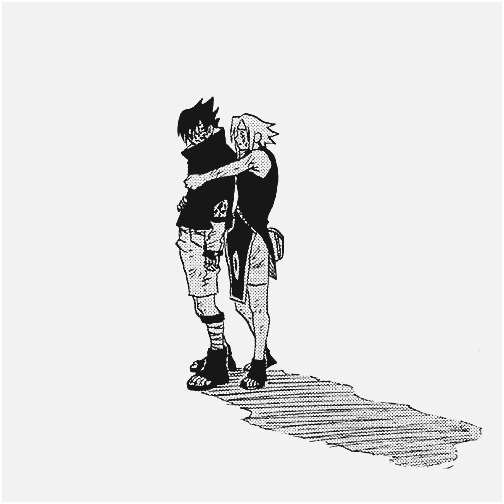
Part 2 : http://sasukeuchihayas.tumblr.com/post/160820240389/this-comes-full-circle-in-the-gara-fight-when
Part 3 : http://sasukeuchihayas.tumblr.com/post/160820241909/if-we-do-a-time-skip-to-after-the-akatsuki-arc
#sasuke#pro sasuke#sasusaku#pro sasusaku#pro sakura#pro naruto#pro kakashi#anti sns#pro sns brotp#lol this person blocked me#can u believe
57 notes
·
View notes